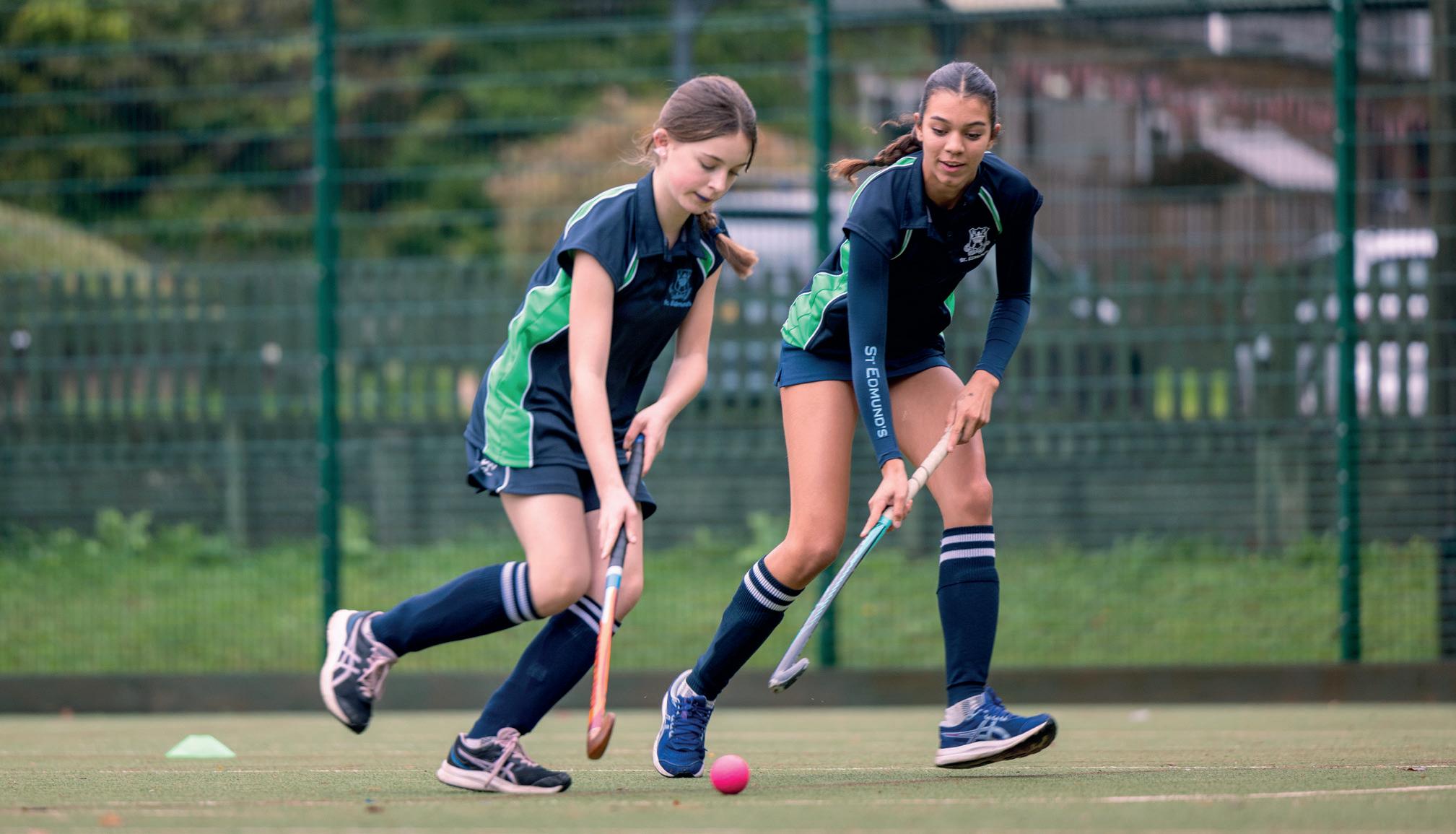I/GCSE OPTIONS BOOKLET
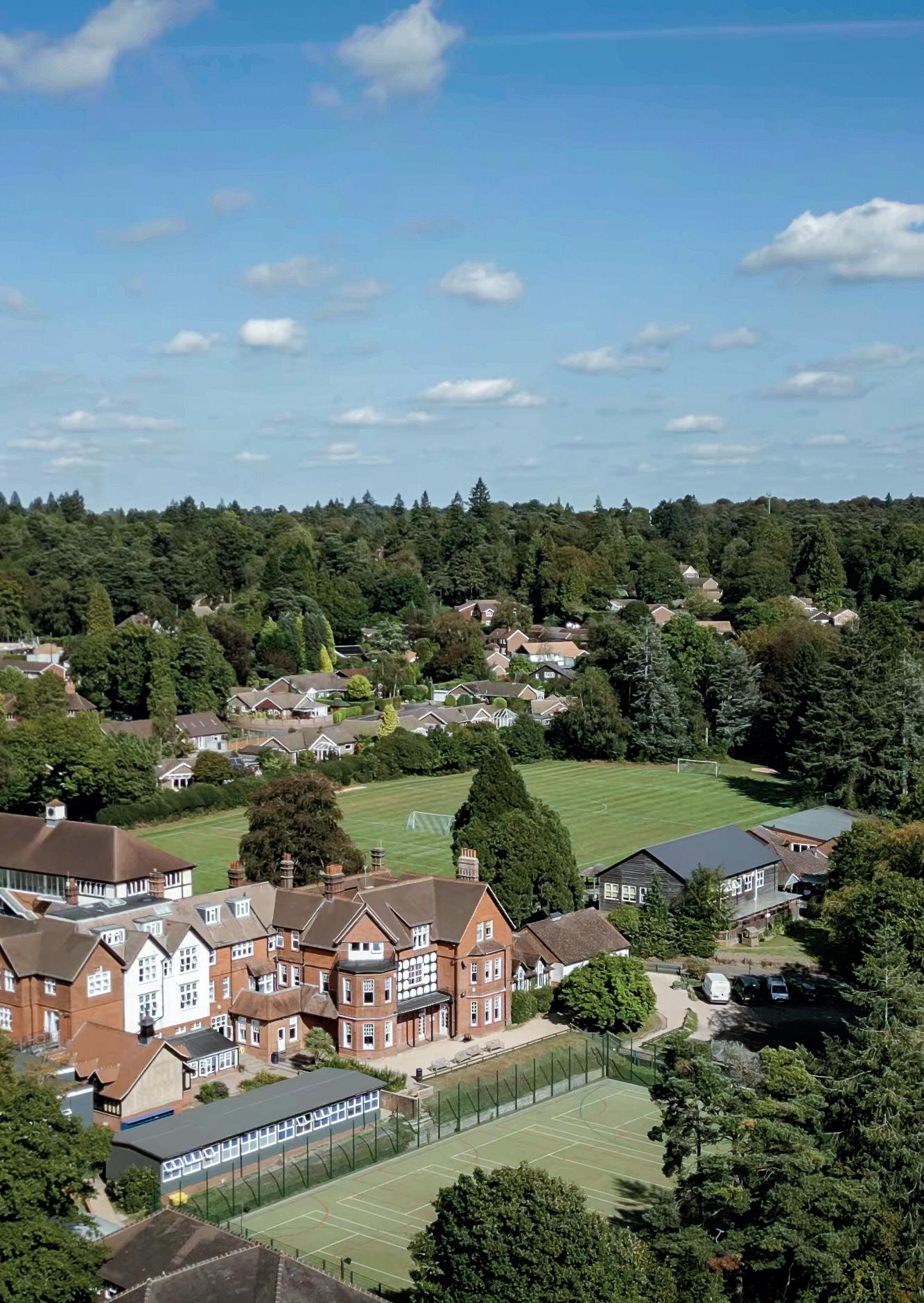


This I/GCSE Options Booklet will provide you with an outline of the necessary information you need to choose your I/GCSE subjects. It will also assist with discussions both during our Options Evening in the Lent term, and with teachers, tutors and Mr Hyett, Deputy Head (Senior Academic).
Students choose their I/GCSE Options towards the end of Form 8, enabling pupils to start studying their selected Options from Form 9.
Pupils study a core curriculum of compulsory subjects in Forms 9 to 11 which include:
• English Language
• English Literature
• Maths
• Science (Combined or Triple Award)
• Religious Studies
Whilst some pupils find making decisions about their I/GCSE courses very straightforward, we understand that some may need a little more time to think and discuss their options. We are here to advise students regarding subject choices so that pupils may achieve their very best. A wide range of combinations will be available, but not every combination is always possible, so pupils may need to be flexible with their choices.
In addition, through discussions with teachers, tutors and the Deputy Head (Senior Academic), pupils will be able to make an informed choice regarding four further subjects to study at I/GCSE level. In order to provide a broad and balanced curriculum, this should (in most cases) include at least one Humanities subject. Triple Award Science is available to able scientists with the agreement of the Science Department. The Options subjects (listed below) are put in Options Blocks and pupils will need to choose ONE subject from each block. The Options Blocks are issued in the letter that accompanies this booklet.
The subjects are:
• Art
• Classical Civilisation
• Computer Science
• Drama and Theatre Studies
• Design and Technology
• Food Preparation and Nutrition
• Geography
• History
• Latin
• French
• Spanish
• Music
• Physical Education
• Sports Science
• The Triple Award Science course (for able scientists)
ENGLISH LANGUAGE
ENGLISH LITERATURE
MATHEMATICS
SCIENCE (COMBINED OR TRIPLE AWARD)
RELIGIOUS STUDIES
The enjoyment of reading, writing, speaking and listening is at the heart of the English Language course, and it is a compulsory subject. Our English course is designed to be fun with a serious intent; we aim to develop pupils’ ability to understand and respond appropriately to what they read, hear and experience. The curriculum provides challenging opportunities. Where necessary, pupils will receive additional teaching through the Academic Support Department who liaise closely with English teachers. During the course, pupils deal with a variety of written and spoken media. We encourage pupils to use sophisticated vocabulary, correct grammar, spelling and punctuation. In addition, pupils develop their sense of style and awareness of audience. We explore different cultures, as well as social, moral and ethical issues. As such, the English syllabus aims to help pupils develop into good citizens, as well as effective readers and writers. The qualification will be awarded using the new 9-1 grading system.
A broad range of texts and tasks enables pupils to develop the skills and knowledge required for their IGCSE studies and beyond. Pupils will use what they have learned about the writer’s craft in their reading of fiction to inspire and influence their own imaginative writing.They should develop a range of creative writing techniques, planning and proofreading skills. Pupils are also encouraged to use ICT in a number of varied and interesting ways. From Form 10, pupils will sit papers similar in style to those that they will be taking in Form 11 for IGCSE.
Paper 1: Assesses 60% of the total English Language (Specification A) qualification and assesses Reading (30%) and Writing (30%). There will be a mixture of short- and long-answer questions related to a non-fiction text from the Pearson International English Anthology and one previously unseen extract. There will also be a writing task, based on a choice of two prompts involving a given audience, form or purpose.
Paper 3: Poetry and Prose Texts and Imaginative Writing coursework (40%). Pupils will study the poetry and prose texts from the Pearson Edexcel International GCSE English Anthology and develop skills to analyse how writers use linguistic and structural devices to achieve their effects. Pupils will develop the skills of inference and analysis. They will also develop imaginative writing skills to engage the reader use spelling, punctuation and grammar accurately assessed by two coursework essays.
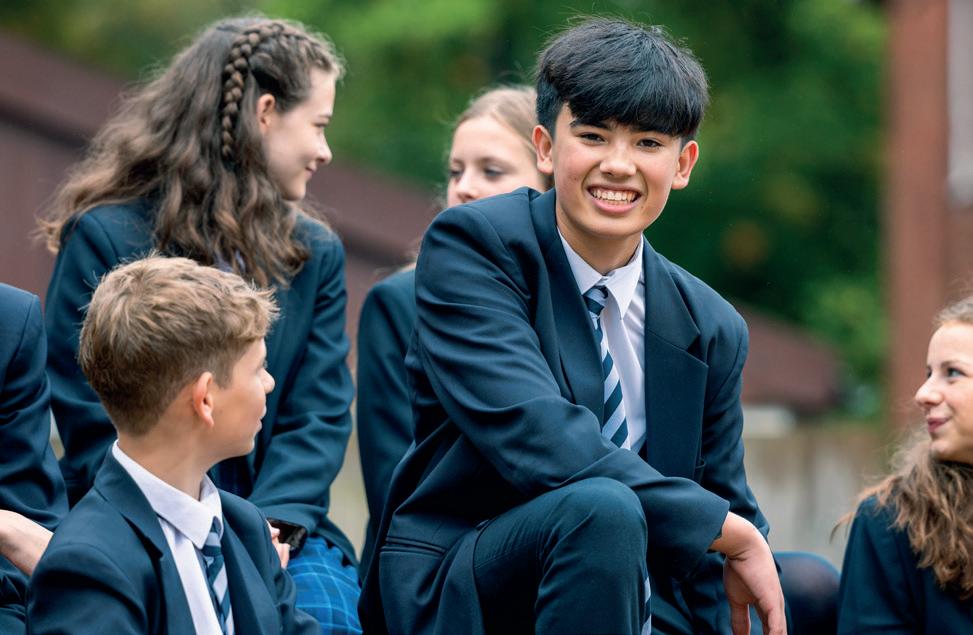
The English Literature course fosters a focused, sensitive, lively and informed personal engagement with literary texts. Pupils read and study a number of literary texts in the three main genres (novels, poetry and drama). Pupils are encouraged to enjoy reading, while also developing a deeper analytical appreciation of how literary texts work and how authors achieve their particular effects. We foster a life-long enjoyment of reading and writing, as well as confidence in speaking and listening skills. The qualification will be awarded using the new 9-1 grading system.
At IGCSE, pupils learn how to link prose, poetry and drama texts to their contexts.
Paper 1: One written examination paper (60%). The pupils study the poetry collection from Part 3 of the Pearson Edexcel International GCSE English Anthology and one modern prose text from the list of set texts. They develop the skills to analyse unseen poetry and how to analyse how language, form, structure and contextual factors can be used to create meanings and effects. They will develop skills to maintain a critical style and informed personal response and develop comparison skills.
Paper 3: Modern Drama and Literary Heritage coursework (40%). Pupils study one modern drama text and one literary heritage text from the list of set texts. They will develop skills to analyse how language, form, structure and contextual factors are used to create meaning and effect. They will also develop skills to maintain a critical style and informed personal response assessed by two coursework assignments on the studied texts.
(Paper 2 is an optional exam – we are taking Paper 3, the coursework module.)
Mathematics develops pupils’ problem solving skills as well as being a compulsory subject for every member of the school to IGCSE level. It develops pupils’ knowledge and understanding of mathematical concepts and techniques. As pupils progress through the course they will have the opportunity to challenge themselves and develop their mathematical thinking as well as being able to apply their mathematical skills in unfamiliar situations. This will help equip them for more advanced study in the subject or related areas as well as being useful or even required in their future workplaces or higher level qualifications.
Pupils will use and apply mathematical techniques and concepts and become confident in using these to solve problems. Pupils will also develop knowledge of the wide variety of applications and roles that the subject has, not just in society and employment but also broader academia. Furthermore, pupils will learn mathematical and analytical skills which are transferable to other curriculum areas.
The Pearson/Edexcel I/GCSE Mathematics qualification is a two year course of study ending with two exams taken at the end of Form 11. Each paper is two hours long and they are worth an equal amount of marks.
Calculators are permitted for both of these exams and there is no coursework or continually assessed component to the qualification.
There are two tiers of entry for the I/GCSE Mathematics qualification – Foundation or Higher tier. Pupils will be entered at the tier most suited to their mathematical ability.
Foundation tier papers are designed for pupils who are unlikely to achieve a high grade but whose achievement can still be recognised with a grade at the appropriate level. The highest grade Foundation tier pupils can be awarded is grade 5. Questions in the Foundation tier are targeted at grades 5 to 1.
Higher tier papers are designed for pupils who are likely to achieve at least a grade 4. Knowledge of all Foundation tier content is assumed and some questions are common to both tiers. The highest grade which can be awarded on the Higher tier is a grade 9.
Foundation and Higher tier exams are sat at the same time and pupils cannot be entered for both examinations.
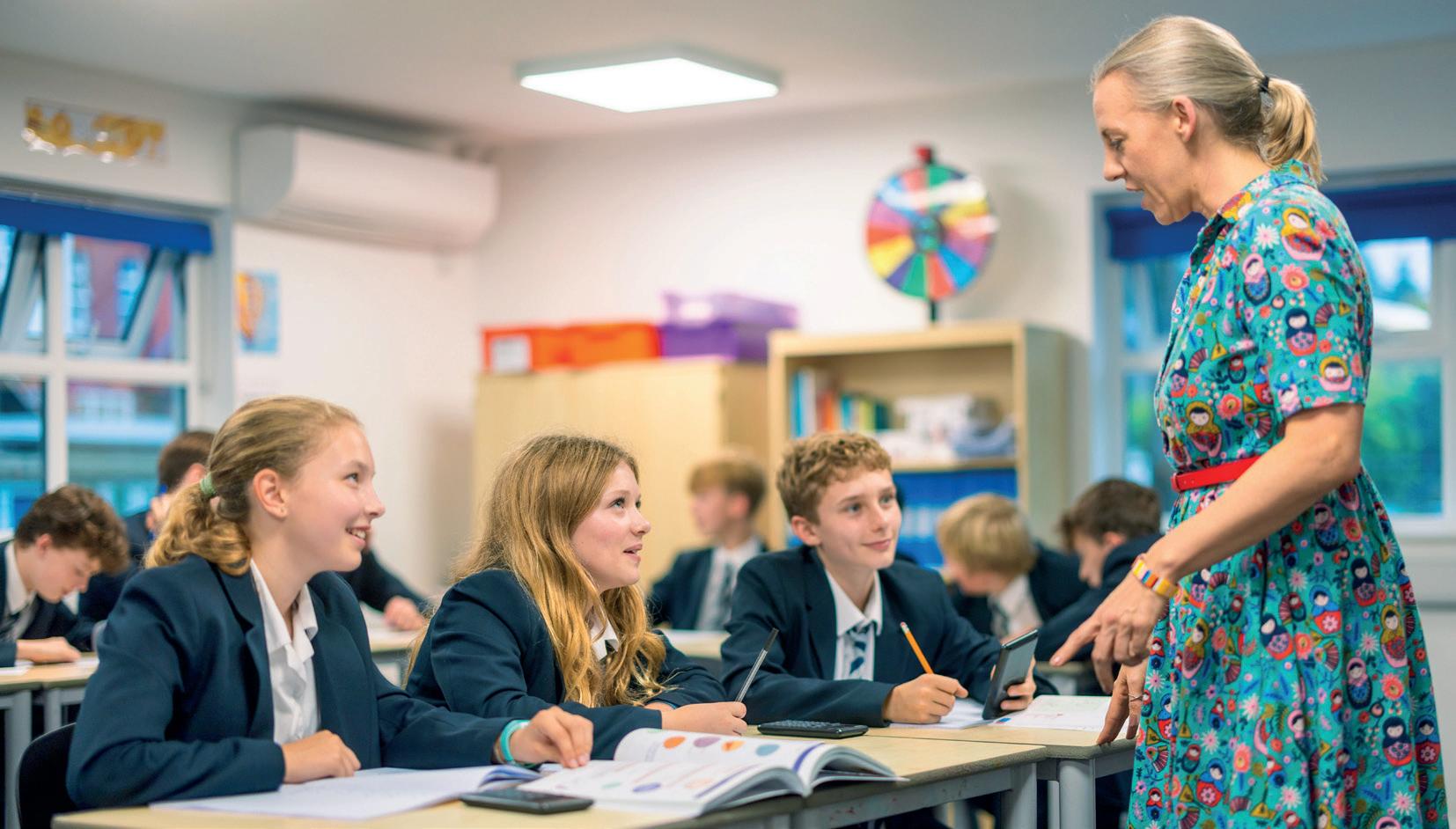
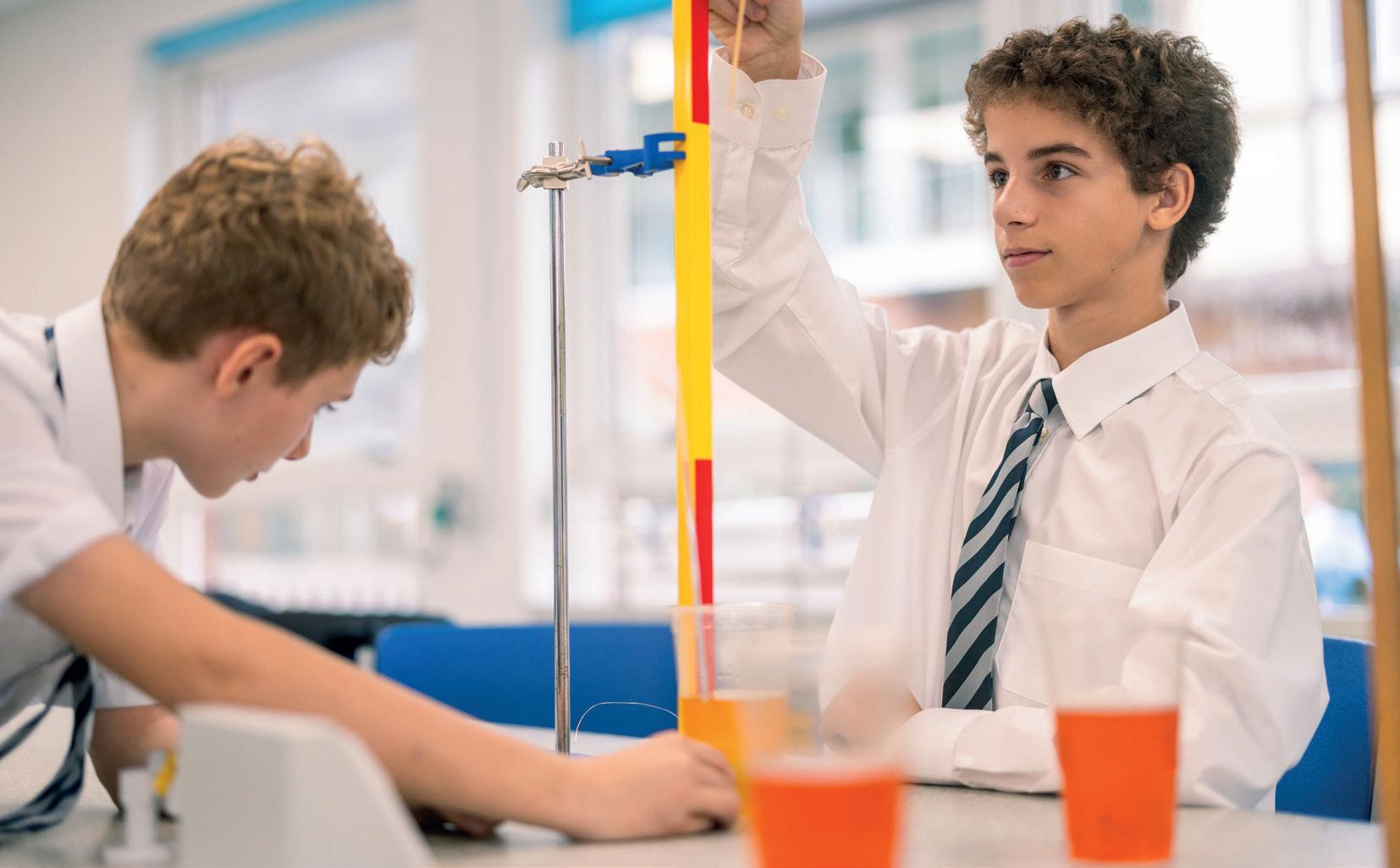
The Pearson/Edexcel GCSE Science courses enable students to acquire scientific knowledge and facts, as well as an understanding of scientific concepts and principles. Students are encouraged to appreciate the practical nature of science, acquiring experimental skills based on correct and safe laboratory techniques then using the data they gather to assess a hypothesis which they have produced. Students should be able to evaluate, in terms of their scientific knowledge and understanding, the benefits, and drawbacks of real-life applications of science, thinking about the topics we study as being relevant to the real world. GCSE Science at both Combined and Triple Award level provide a solid foundation for further study of Science courses at IB, A-level and beyond.
Students who aspire to enter University to study prestigious courses such as medicine, veterinary science and engineering will need to demonstrate their abilities in these subjects.
Combined science is the standard science curriculum which most students take and is suitable for IB and science-related A-levels.
• All students will study all three sciences –Biology, Chemistry and Physics.
• Students will earn two grades in Combined Science.
• Student’s final grades reflect their performance across the three subjects.
The GCSE in Combined Science should enable students to:
• Develop scientific knowledge and conceptual understanding through the specific disciplines of Biology, Chemistry and Physics.
• Develop understanding of the nature, processes and methods of science, through different types of scientific enquiries that help them to answer scientific questions about the world around them.
• Develop and learn to apply observational, practical, modelling, enquiry and problem-solving skills in the laboratory, in the field and in other earning environments.
• Develop their ability to evaluate claims based on science through critical analysis of the methodology, evidence.
Combined Science includes 6 examinations, 2 for each science. All examinations can be sat at Foundation Tier (grades 1-5) or Higher Tier (grades 4-9) but all the assessments must be of the same tier. Each exam is 1 hour and 10 minutes long.
Students can choose to gain a separate GCSE in each science. Taking each science as a separate GCSE in this way is commonly called Triple Award or Triple Science. Triple award GCSE Science in an optional subject, for able and enthusiastic scientists.The science department will advise if this option is suitable for students. Students who select Triple Award study extra material in all three sciences – Biology, Chemistry and Physics for 2 hours each week. Students will earn three GCSEs, one in each science. Their grades will reflect their performance in each subject individually.
Triple Award science contains additional content. This allows concepts to be explored in more detail or for entirely new areas of study to be looked at. For those students who are really interested in how the universe works from black holes to bacteria, triple science has something to offer.
Many students wish to go on to work STEM (Science, Technology, Engineering and Maths) careers and even more choose to study the sciences at A-level. While Triple Award is not required for A-level it is better preparation and nearly triple scientists study two or more science A-levels when leaving Saint Edmund’s.
Triple Award includes 6 examinations, 2 for each science. All examinations can be sat at Foundation Tier (grades 1-5) or grades 4-9). The examination for each science must be of the same tier however this does allow students to sit different tier in different sciences. E.g. Foundation for Biology and Higher for Physics.
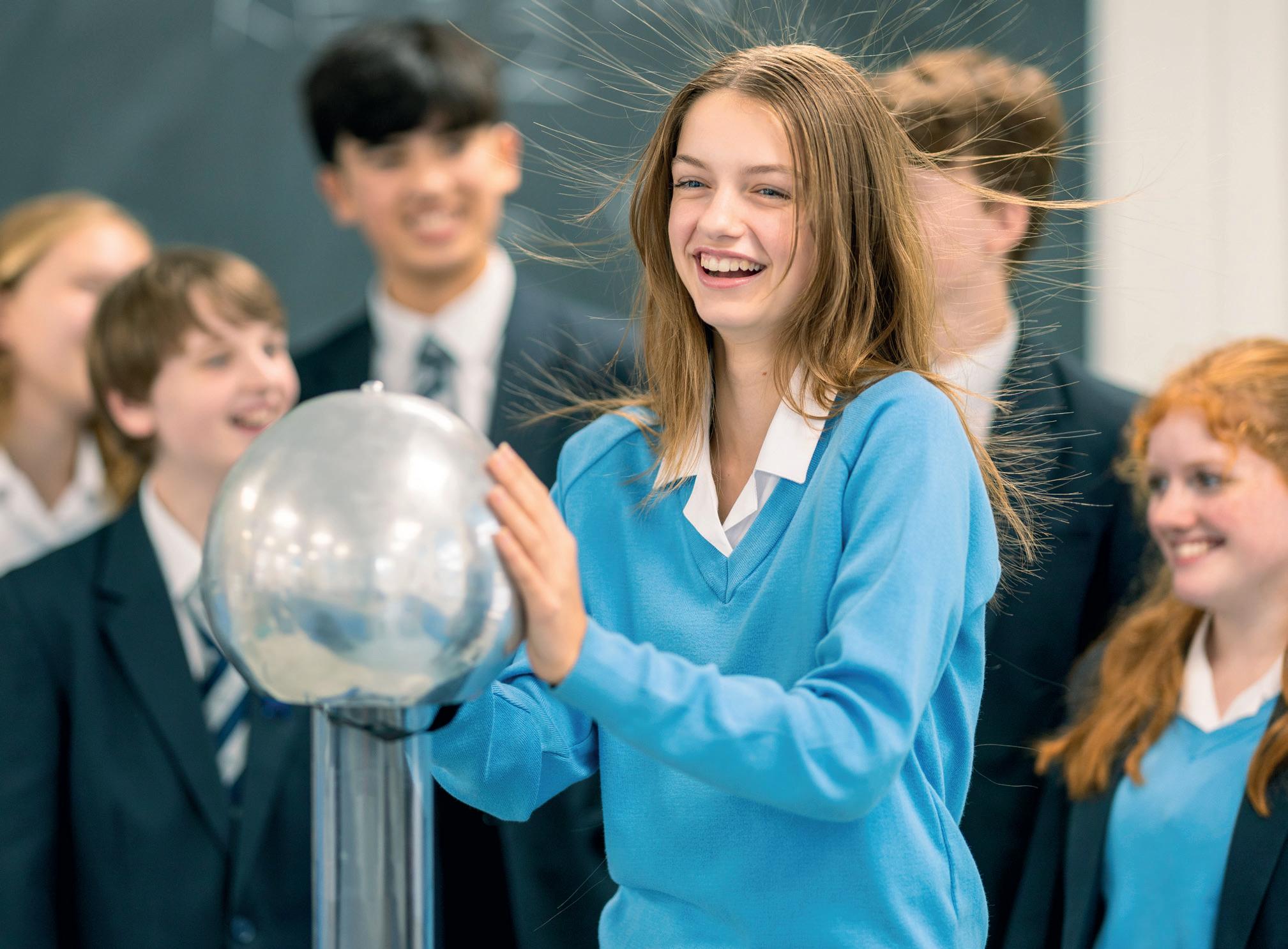
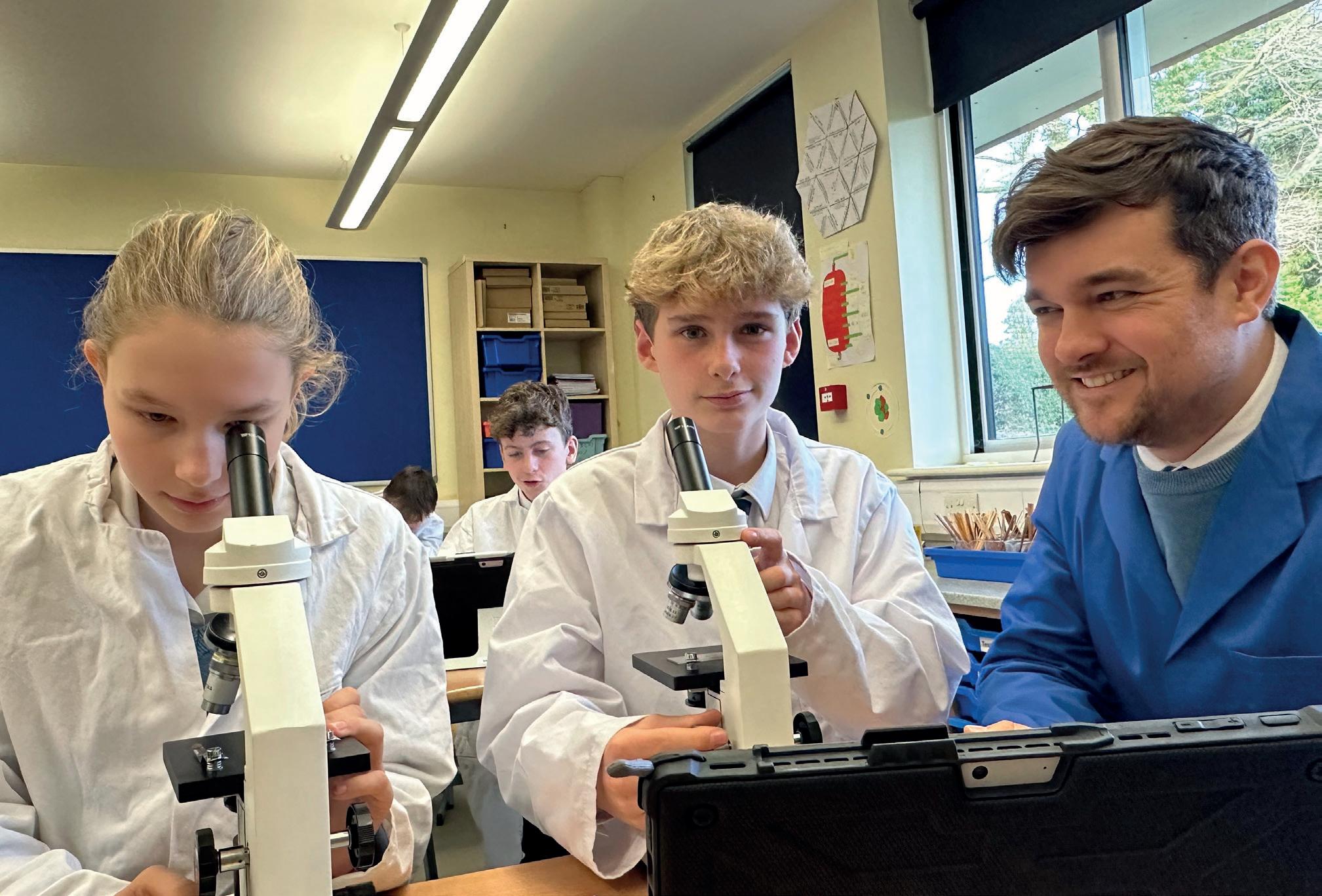
Biology consists of 9 different topics covering DNA, cell structures, organs, and the ecosystem:
Topic 1 – Key concepts in biology
Topic 2 – Cells and control
Topic 3 – Genetics
Topic 4 – Natural selection and genetic modification
Topic 5 – Health, disease and the development of medicines
Topic 6 – Plant structures and their functions
Topic 7 – Animal coordination, control and homeostasis
Topic 8 – Exchange and transport in animals
Topic 9 – Ecosystems and material cycles
A key component of Science is having the chance to get your hands dirty doing practical work.
Example experiments include:
• Dissections
• Preparing and examining microscope slides
• Investigating factors affecting photosynthesis
• Field work surveying ecosystems
The Triple Award course contains the Combined Award content, plus unique extension material which is designed to stretch and challenge. As well as the topics outlined above, pupils will also be expected to have an understanding of the list below as well as many others:
• Food security
• Crops and pest control
• Protein synthesis and genetics
• Responses to stimuli
The IGCSE course is divided into 9 main topics:
Topic 1 – Key concepts in chemistry
Topic 2 – States of matter and mixtures
Topic 3 – Chemical changes
Topic 4 – Extracting metals and equilibria
Topic 5 – Separate chemistry 1
Topic 6 – Groups in the periodic table
Topic 7 – Rates of reaction and energy changes
Topic 8 – Fuels and Earth science
Topic 9 – Separate chemistry 2
A key component of Science is having the chance to get your hands dirty doing practical work.
Example experiments include:
• Distillation
• Electrolysis
• Creation of salts
• Extraction of copper from its ore
• Reversible chemical reactions
• Reactions of alkali metals
Pupils who wish to tackle Triple Award Chemistry will study the Combined Award content, plus:
• Dynamic equilibria
• Fuel cells
• Alcohols and carboxylic acids
• Nanoparticles
• Polymerisation
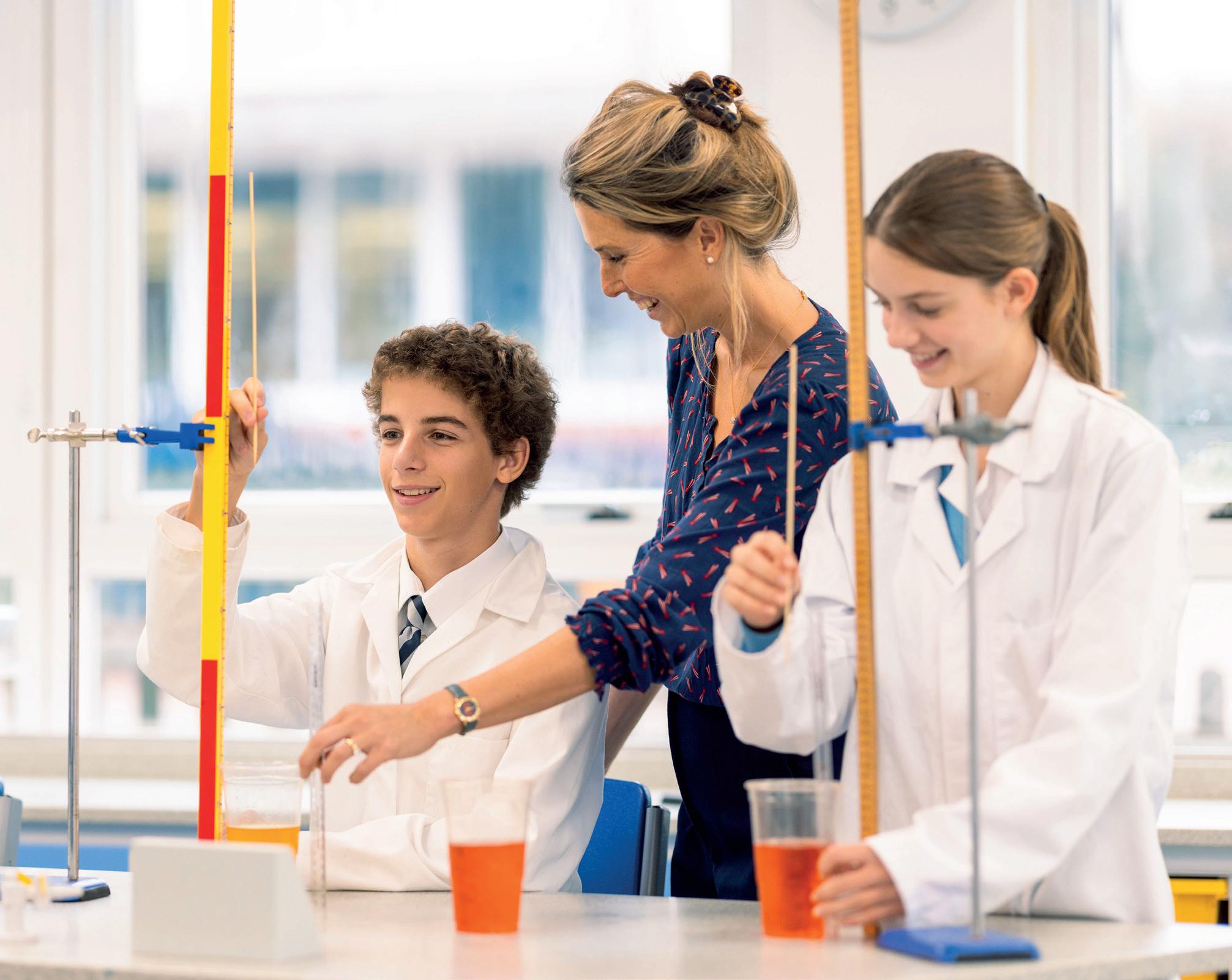
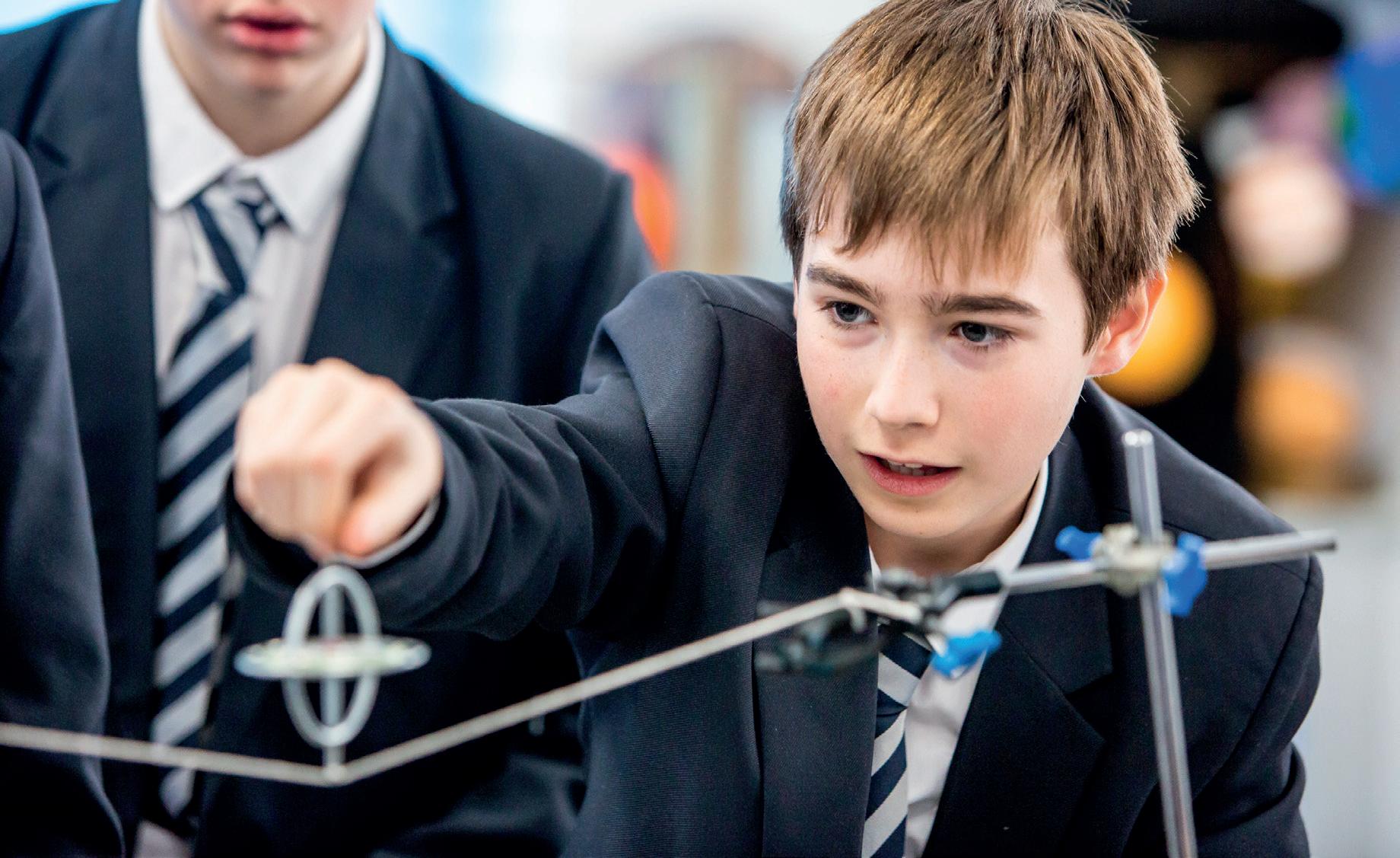
Physics consists of 15 focused topics that covers every area between atomic nuclei and the structure of the universe:
Topic 1 – Key concepts of physics
Topic 2 – Motion and forces
Topic 3 – Conservation of energy
Topic 4 – Waves
Topic 5 – Light and the electromagnetic spectrum
Topic 6 – Radioactivity
Topic 7 – Astronomy
Topic 8 – Energy – Forces doing work
Topic 9 – Forces and their effects
Topic 10 – Electricity and circuits
Topic 11 – Static electricity
Topic 12 – Magnetism and the motor effect
Topic 13 – Electromagnetic induction
Topic 14 – Particle model
Topic 15 – Forces and matter
Sample Experiments we will perform in GCSE Physics
A key component of Science is having the chance to get your hands dirty doing practical work.
Example experiments include:
• Study of mechanical systems including springs
• The interactions of light with different materials
• Constructing electrical circuit
• Measuring specific heat capacity
The Triple Award for physics contains the Combined Award content, plus advanced material with a focus on applying more complex mathematical methods to different situations. The material is spread across all the above chapters and goes to advanced level of detail. This covers but is not limited to:
• Sound
• Wave interaction
• Nuclear Fission
• Astronomy
• Static Electricity
Religious Studies is compulsory for all students in Forms 9 and 10 where they will study the GCSE course over the two years before sitting their exam at the end of Form 10. An understanding of religion and culture is vital in today’s world. Religion is a foundational part of many aspects of society whether it is morals, festivals or ceremonies, religion has played an essential role in bringing structure to society and guiding the way we relate to each other. Also, in today’s multicultural world and as they grow older pupils are increasingly like to come across people from other countries, faiths and cultures more and more. In addition, matters of religion and culture are becoming increasingly prevalent in current affairs – whether it is the threat of terrorism, immigration bringing those of other religions and faiths in to the UK, or issues of religious tolerance. Religious Studies also looks at ethical issues and encourages pupils to think deeply about controversial issues, giving students the opportunity to ask questions, find out how they feel about some of these topics and work out why they are important. Lastly, Religious Studies aims to develop their interest and enthusiasm for the study of Religion and the relationship between Religion and the wider world.
One of the most important skill Religious Studies teaches is the ability to look at an issue from a different point of view and to understand why people might feel differently to ourselves. It also teaches students to dig below the surface of issues and consider how differences in faith, culture, education, country of origin, perceived social class and upbringing shape our thinking. It offers students and environment to form and express their own opinions and to improve their understanding of the various issues.
The course also teaches students important skills in essay writing, expression and exam technique which are important to many subjects.
The Religious Studies course looks at Religion and philosophical and ethical studies.
Component 1(Religion): Christianity: Belief and teachings. Christianity: Practices Islam: Belief and teachings. Islam: Practices
Component 2 (Thematic/Ethical studies): Religion, Peace and Conflict Relationships and Families Religion, Crime and Punishment Religion, Human Rights and social justice
Assessment:
2 exams worth 100% of marks. The papers are sat over an hour and forty five minutes each where students answer a section of questions on each of the topics they have studied.
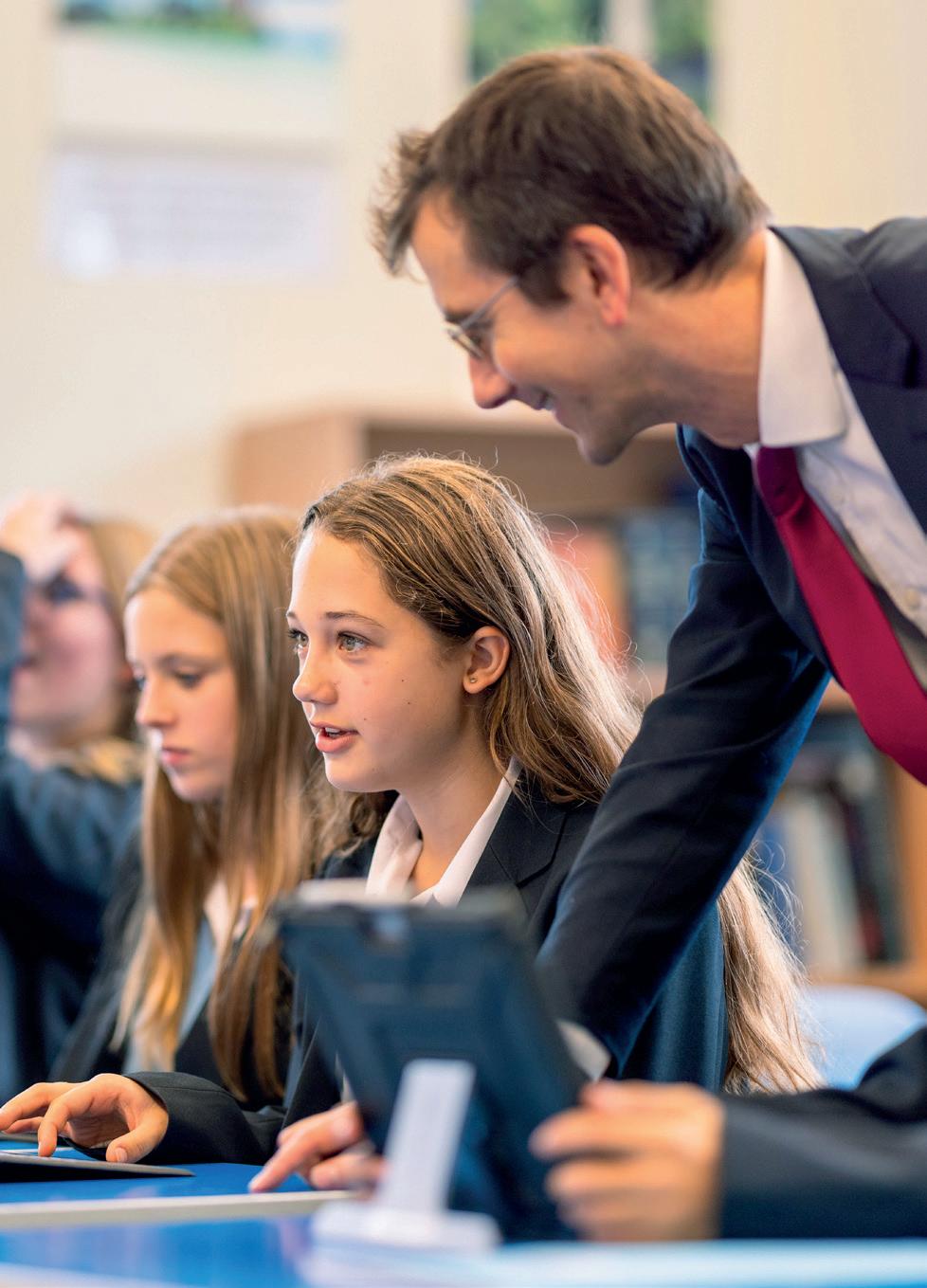
ART
COMPUTER SCIENCE
CLASSICAL CIVILISATION
LATIN
FRENCH
SPANISH
DESIGN AND TECHNOLOGY
DRAMA AND THEATRE STUDIES
FOOD PREPARATION AND NUTRITION
GEOGRAPHY
HISTORY
MUSIC
PHYSICAL EDUCATION
SPORTS SCIENCE
THE TRIPLE AWARD SCIENCE COURSE (FOR ABLE SCIENTISTS)
By choosing to study Art, students are providing themselves with a creative outlet, in an otherwise exam-heavy field of subjects. Students are given the opportunity to develop their creative side and pursue their interests, with a healthy mix of teacher-led activity and independent learning. Students are able to work in a wide range of media, including photography, painting, drawing, sculpture, printmaking and textiles.
Component 1: Portfolio of work (coursework) At least two projects that show coverage of the four assessment objectives;
• AO1: Artist study
• AO2: Development of work
• AO3: Observational work (drawings, photographs, notes etc)
• AO4: Final Piece
Students follow a teacher led scheme of work during the start of Form 9 and Form 10 to develop their skills in drawing, painting, ceramics, textiles and printmaking. Students are given more freedom to develop their art as the course progresses, and are able to steer projects in the direction of where their art skills and interests lie.
• Continuous feedback through course
• Final assessment in Lent term of Form 11
• 96 marks
• 60% of GCSE
Component 2: Externally Set Assignment (exam)
One project, chosen from an exam paper handed out in January in Form 11. Students respond to their chosen starting point evidencing coverage of all four assessment objectives.
• AO1: Artist study
• AO2: Development of work
• AO3: Observational work (drawings, photographs, notes etc)
• AO4: Final Piece
The format is similar to Component 1, but the final piece is completed in exam conditions over two days (10 hours).
• 96 marks
• 40% of GCSE
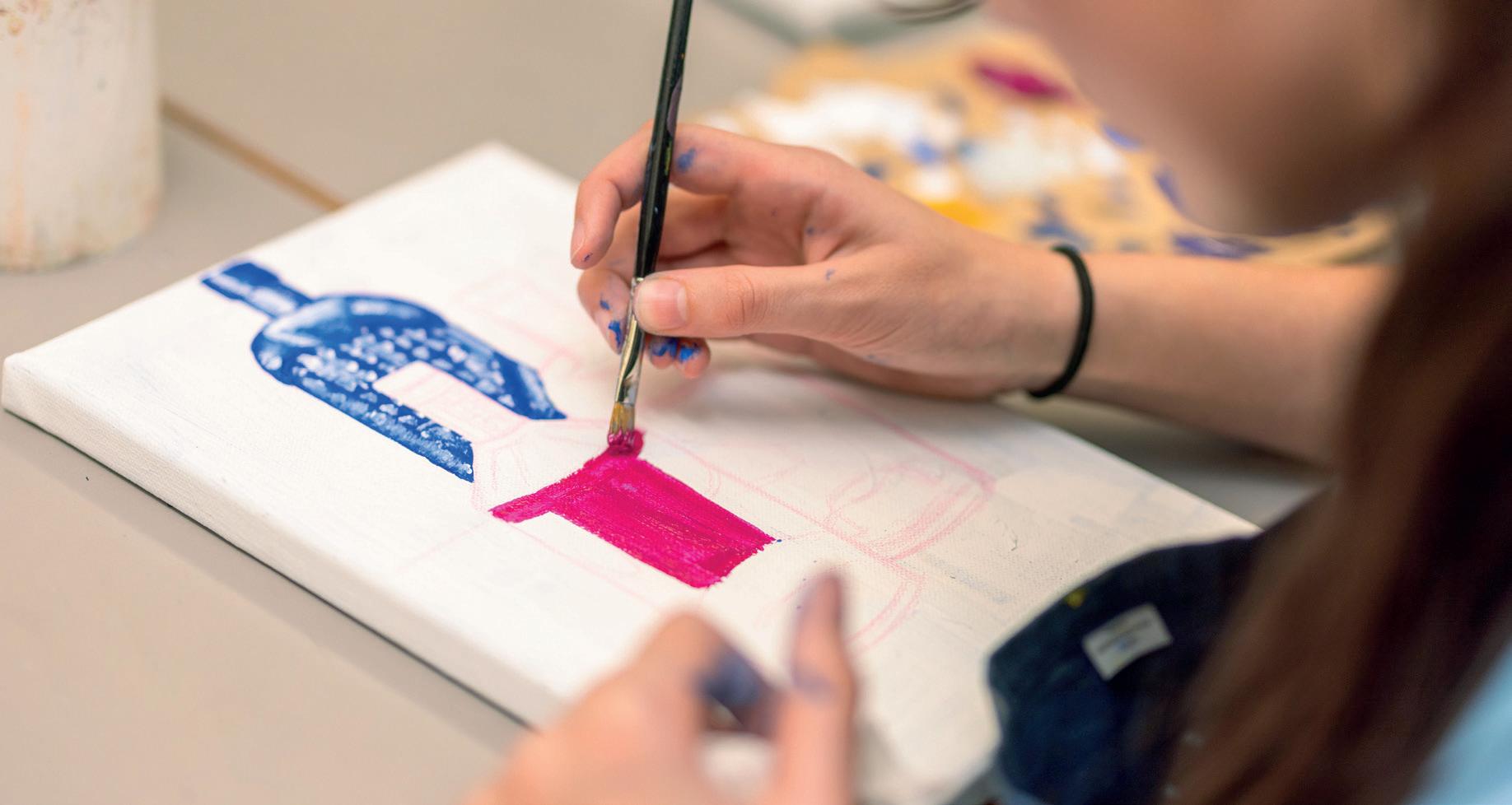
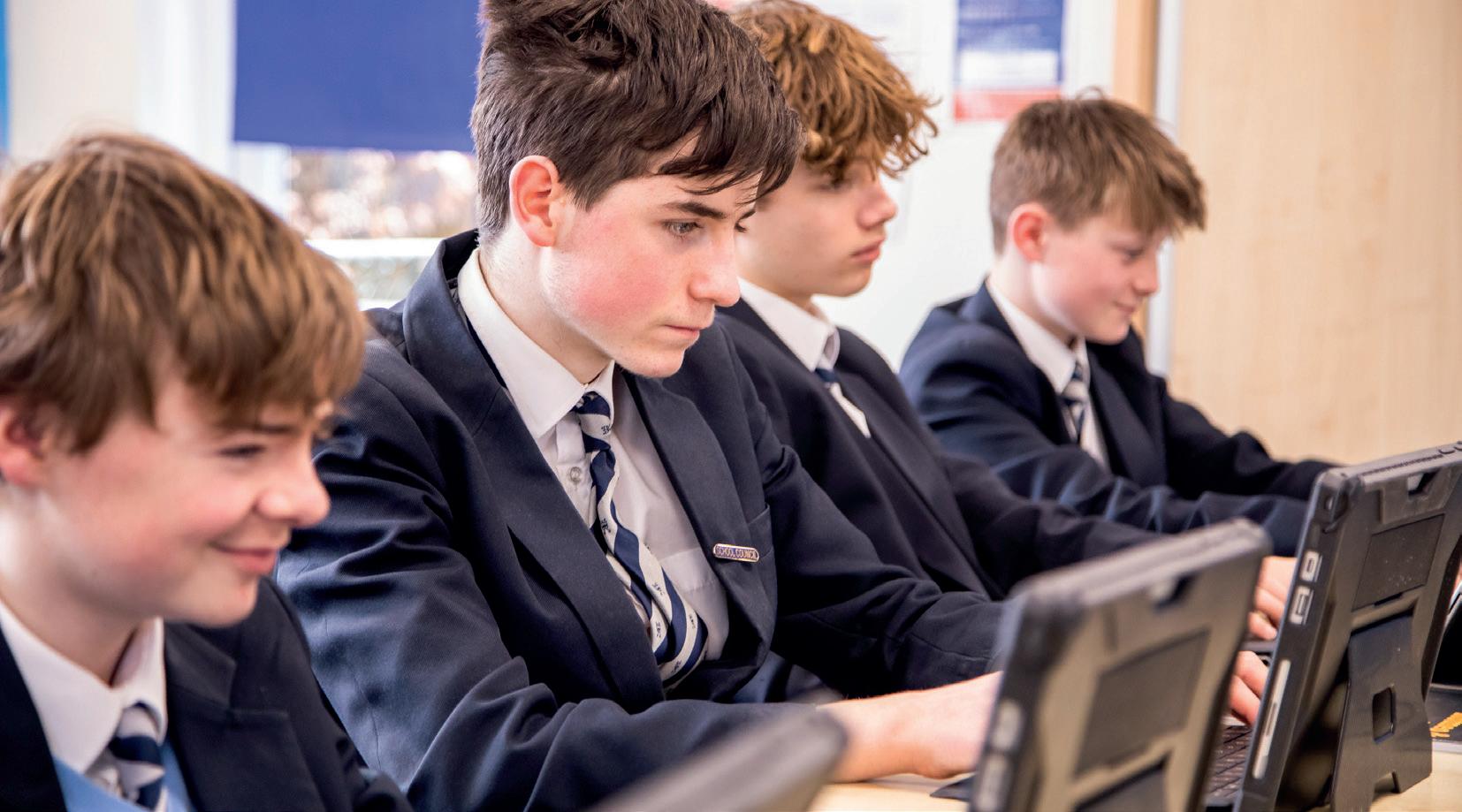
The world depends on computers. In this course you will learn about how computers work, the networks they use and how programming can create solutions to everyday problems and future challenges. Computer Science is constantly evolving, and this course will help to prepare you for an increasingly digital world.
By studying Computer Science, you will develop your problem solving skills, be able to solve real-world problems and open the door to your future career. Computer Science is distinct from ICT and places emphasis on computational thinking. This involves:
• Using abstractions and pattern recognition to represent the problem in new and different ways
• Logically organising and analysing data.
• Breaking the problem down into smaller parts.
• Approaching the problem using programmatic thinking techniques such as iteration, symbolic representation, and logical operations.
• Reformulating the problem into a series of ordered steps (algorithmic thinking).
• Identifying, analysing, and implementing possible solutions with the goal of achieving the most efficient and effective combination of steps and resources.
• Generalising this problem-solving process to a wide variety of problems.
You will also learn to code using the Python programming language.
Paper 1: Principles of Computer Science –Written Examination
• Computational thinking – understanding of what algorithms are, what they are used for and how they work; ability to follow, amend and write algorithms; ability to construct truth tables.
• Data – understanding of binary, data representation, data storage and compression.
• Computers – understanding of hardware and software components of computer systems and characteristics of programming languages.
• Networks – understanding of computer networks and network security.
• Issues and impact – awareness of emerging trends in computing technologies, and the impact of computing on individuals, society and the environment, including ethical, legal and ownership issues.
Paper 2: Application of Computational Thinking – Practical Onscreen Examination
• Understanding what algorithms are, what they are used for and how they work in relation to creating programs.
• Understanding how to decompose and analyse problems.
• Ability to read, write, refine and evaluate programs.
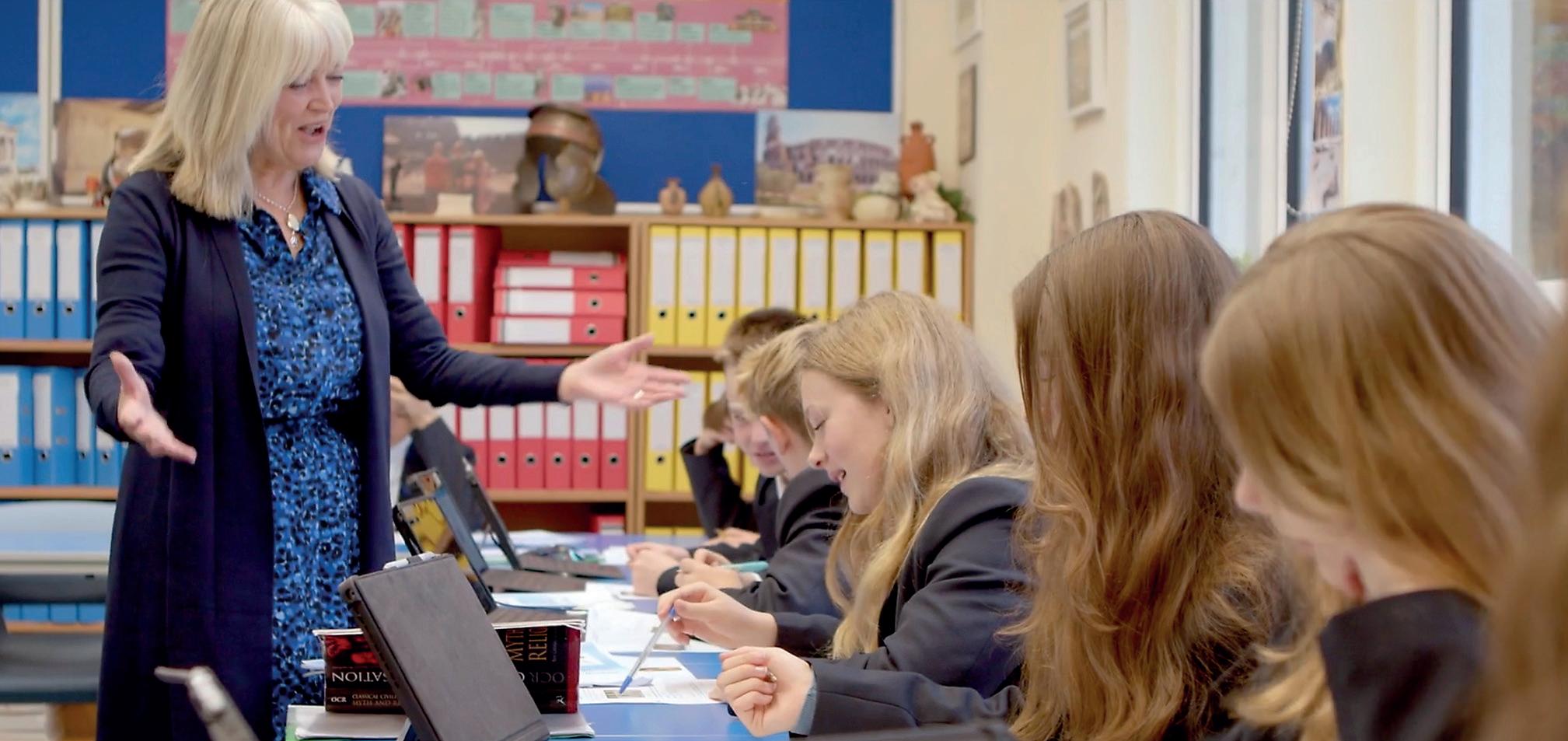
From the Greek gods of Mount Olympus and the universal heroes Heracles and Theseus, to Roman symbols of power such as the Ara Pacis and Prima Porta Statue, the study of the Ancient World at GCSE offers unique variety and interest.
Areas of study also include the battles of Thermopylae and Salamis,Trajan’s Column and the Dacian Wars. These subjects have underpinned the study of Classics for centuries, a visit to Pompeii and Rome or Athens during the Lent term will help bring many of these topics to life.
Debate will encourage confidence while studying ancient societies in context will build empathy and understanding.
The ability to put aside one’s own assumptions and be objective when evaluating other societies is central, for example when considering the role of death and burial in the ancient world. Study of Classical civilisation at GCSE level helps pupils to develop research and planning skills that will underpin further studies at A-Level or university, while the variety of sources studied generates understanding of how we acquire knowledge of the past and the need to be critical in our response.
Thematic Study Unit: Myth and Religion: Children will be expected to closely analyse a wealth of visual material during their studies including: the architecture of the Temple of Zeus at Olympia; the Parthenon in Athens and the Pantheon in Rome; and pottery fragments such as the Theseus Kylix and Panathenaic amphorae. Literary sources include the Homeric Hymn to Demeter and extracts from Livy, the Early History of Rome and Plutarch’s Parallel Lives: Comparison of Theseus and Romulus.
Literature and Culture Unit: War and Warfare: This unit is made up of two elements – one in-depth cultural study and one study of related literature. The in-depth cultural study element is based on: Sparta at War in the 5th Century; Athens at War in the 5th Century; the Roman Military in the Imperial Period and the Romans at War. The literature element covers extracts from Homer (the Iliad),Tyrtaeus (the Fallen Hero), Horace (Ode 3.2) and Virgil (the Aeneid).
A genuine interest in the ancient world and an ability to analyse ancient literature in translation is necessary in order to succeed in this rewarding, but specialised, subject. Both units are worth 50% of the GCSE and entail 2 separate exams of 1 hour 30 minutes each.
Studying the Latin language for GCSE offers both great challenges and great rewards. As a subject it is very highly regarded by universities and employers because it requires a disciplined approach while also encouraging important analytical and evaluative skills. The influence of Ancient Roman language, culture and literature remains pervasive throughout modern Western society, and the course introduces a variety of great literature and ideas from this period. Language work will enhance understanding of English and other ‘romantic’ languages such as French and Italian, and small class sizes will allow great flexibility to explore avenues of personal interest based on the increased options offered by OCR.
Through building knowledge of Latin vocabulary, grammar and syntax and translating increasingly complex passages from Latin verse and prose, pupils will develop a disciplined, logical and analytical approach which will be valuable in many areas of life. The focus on creating a natural and convincing translation will also enhance pupils’ own development as writers. The study of verse and prose texts in Latin will complement the skills of literary analysis being learned in English, and will enhance awareness of how writers create meaning, as well as understanding of generic and stylistic features. Importantly, an immersion in Latin literature will encourage awareness and understanding of Ancient Roman society and invite thoughtful comparison with modern attitudes and customs.
Component 1 – Language: Pupils study texts and stories in Latin to build knowledge and understanding of Latin vocabulary, accidence and syntax. Pupils will study the prescribed vocabulary and grammatical constructions over the three-year course, building on prior knowledge of Latin and extending GCSE constructions at an individualised pace. We will use a variety of text books and exercise, underpinned by regular translation and comprehension practice.
Component 2 – Prose or Verse Literature: Pupils study Latin set texts and answer questions in English on aspects of content and analyse, evaluate and respond to the ancient literature they have studied. The texts will be read throughout the course and linked closely to language work. Pupils will learn how to respond in writing to questions about devices and effects, and will also study scansion for verse texts.
Component 3 – Literature and Culture: Learners study two topics on Roman Civilisation and Culture and answer questions in English on aspects of content, culture, social practices and values. Two topics are studied from a bank of three, on a 2-yearly rolling basis: Myths and Beliefs; The Romans in Britain; Entertainment.
The course is examined through 3 written examinations:
Unit 1: 1 hour 30 minutes, worth 50% of the total GCSE.
Units 2 & 3: 1 hour each, worth 25%, totalling 50% of the GCSE.
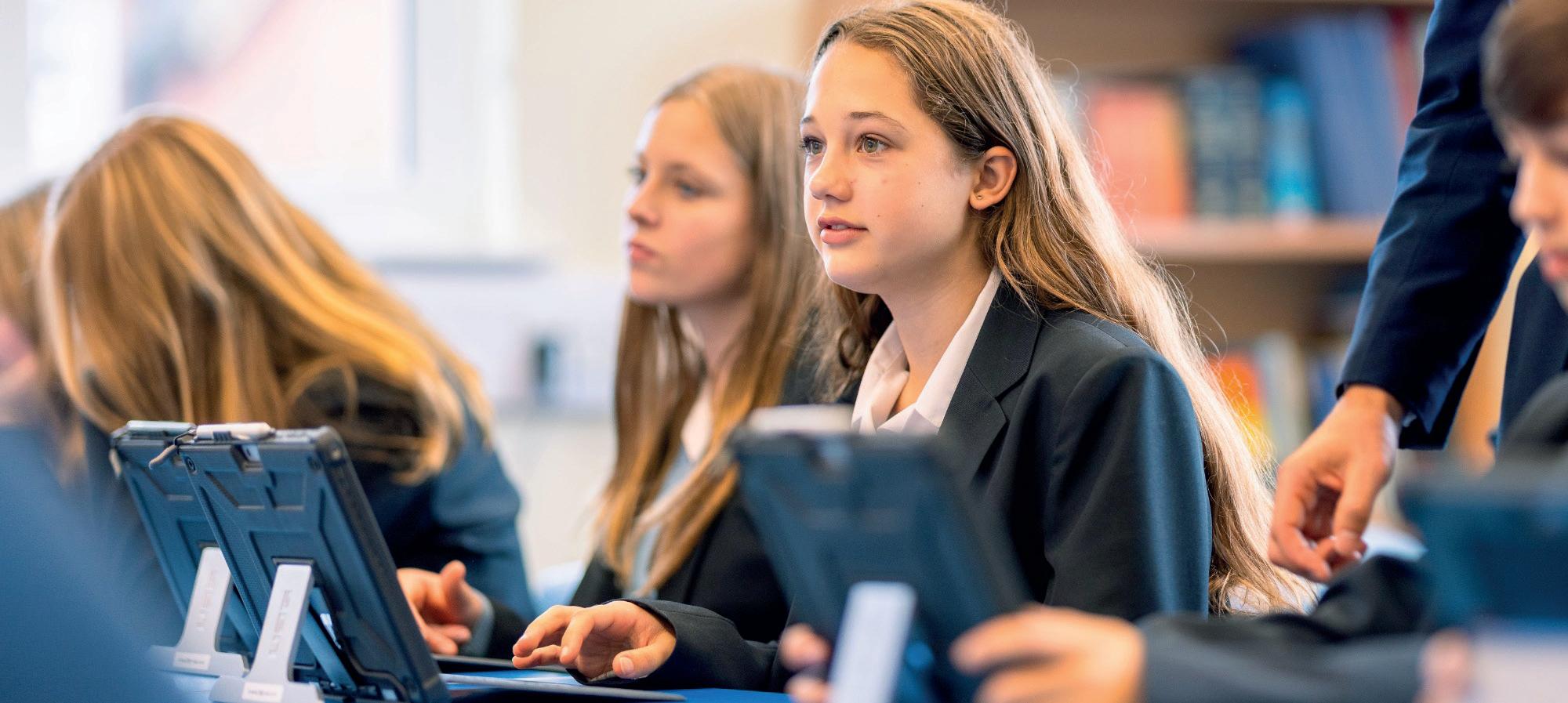
Many universities and employers look favourably on a foreign language qualification in recognition of the breadth of knowledge and range of skills that these courses provide. French is spoken by over 200 million people worldwide, while Spanish has 495 million speakers. Being able to communicate with people across the globe often gives students the confidence to make the most of future opportunities to travel, work and live abroad. Learning about other cultures increases a broader understanding of humanity and tolerance of different ways of life. Speaking more than one language can increase brain capacity and improve the memory too. Learning a foreign language may also help you understand your own language and make it easier to learn others in the future. Learning translation skills is excellent for developing your problem-solving abilities and could lead to future job opportunities.
Building on their previous learning, pupils develop their knowledge and understanding in four key skills: listening, reading, speaking and writing. Pupils will improve their ability to communicate successfully, by developing a wider vocabulary and a greater awareness of grammar rules and their applications. They will develop their awareness of tone and register and extract information from a range of texts and audio material in the target language. They will practise asking and responding to questions on a variety of topics, communicating information and opinions effectively in speech and in writing. In addition, pupils will familiarise themselves with aspects of the culture, society and current affairs.
Both GCSEs focus on more advanced grammar and vocabulary and allow pupils to convey opinions on a variety of topics such as shopping, sport, food and the environment. There is also the opportunity to explore aspects of other cultures in greater depth. Both courses require a significant commitment from pupils to learn vocabulary and grammar independently, with over 2,000 words to learn per GCSE.
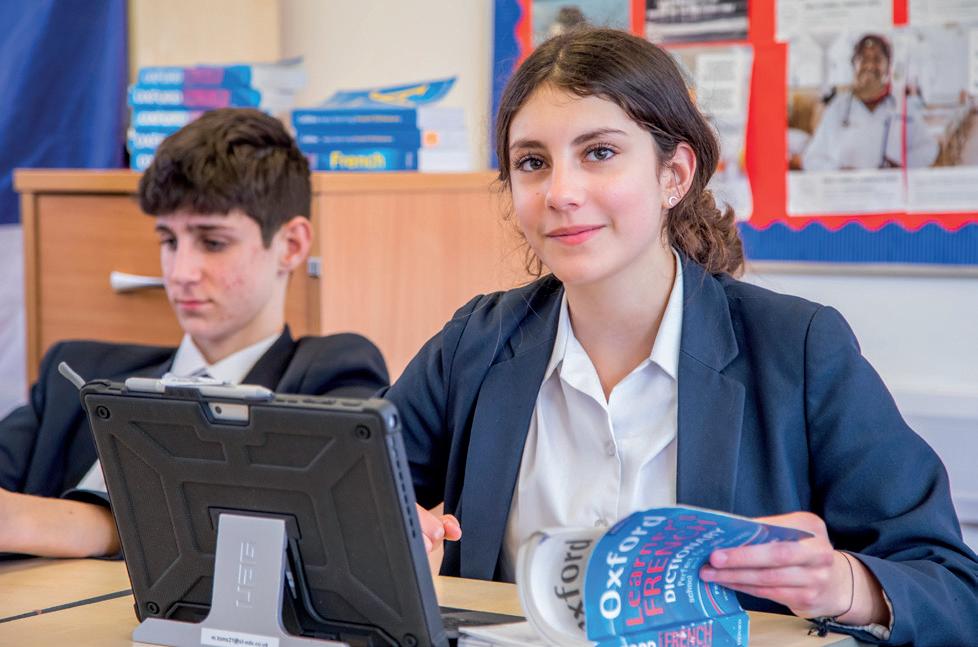
The AQA GCSE course content assesses pupils’ mastery of grammar and linguistic structures, as well as vocabulary related to the following topic areas:
• Identity and culure;
• Local area, holiday and travel;
• School life;
• Future aspirations, study and work;
• International and global areas of interest.
The AQA GCSE examination will assess pupils’ ability to understand and respond to the spoken and written language as well as communicate effectively and accurately in writing and in speech showing knowledge of vocabulary and grammar covered by the syllabus. Pupils will be assessed at the end of Form 11 by way of four tiered papers (Foundation and Higher), which will be marked externally by AQA examiners.
The papers are structured as follows:
Listening paper – 25% of mark
Speaking paper – 25% of mark.
Reading paper (including translation) – 25% of mark
Writing paper (including translation) – 25% of mark.
The overall exam result will be graded from 9 to 1. Decisions about tier of entry (either Foundation or Higher) will be made by the class teacher in conjunction with the Head of Department.
For pupils wishing to take an option in Design and Technology we shall be offering the Cambridge IGCSE Design and Technology syllabus. This syllabus enables pupils to identify, consider and solve problems through creative thinking, planning and design and by working with different media, materials and tools. As a result, pupils gain greater technical and design awareness, while developing skills such as initiative, resourcefulness, enquiry and ingenuity. They also develop the communication skills central to design making and evaluation.
• Develop creative thinking in areas relevant to design and technology
• Learn how to apply problem solving skills to practical and technological problems
• School life;
• Develop the communication skills central to design, making and evaluation
• Learn how to apply knowledge and understanding to the design and making of products, taking into consideration sustainability and the wider impact on society
• Develop the ability to make aesthetic, economic, moral and technical value judgements.
The course is split into 3 key parts:
Product design – this section covers designing, researching, generating ideas, planning, evaluating and making – this includes realisation, awareness of Health and Safety and the possible use of CAD/CAM. This section has a 1 hour 15 minutes question paper worth 25% of the total qualification.
Resistant materials – this section covers material types, plastics, woods, metals, marking out, shaping, joining and assembling and finishing. This section has a 1 hour question paper worth 25% of the total qualification.
Project – Each pupil must complete an individual project that centres on Resistant Materials. Pupils usually work on their project over the final two terms of the course. Pupils produce work in the form of an A3-size folder and the ‘made product’. This is worth 50% of the total qualification.
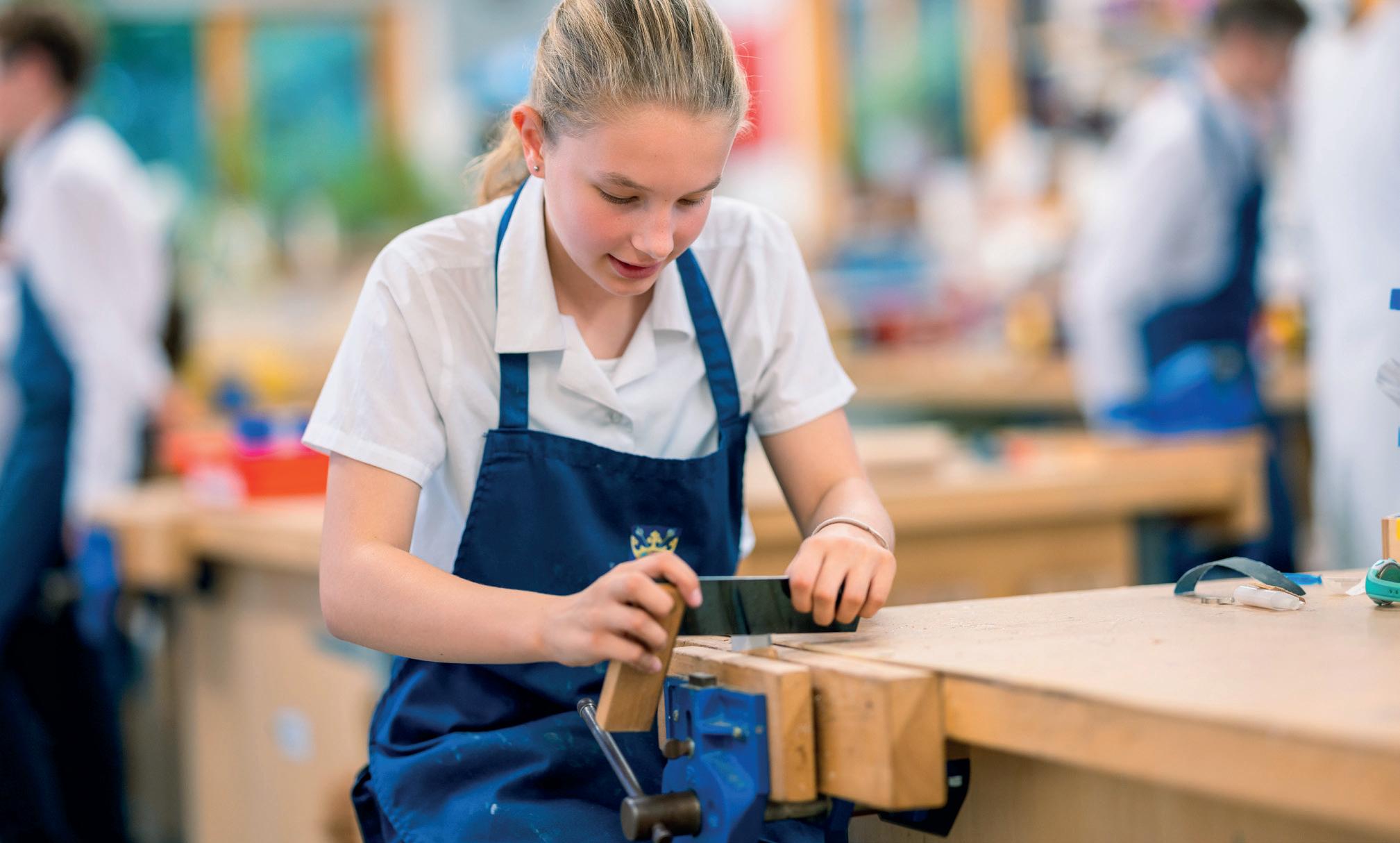
Drama helps pupils to build their confidence through communicating and developing imaginative, physical and vocal skills. Pupils will be encouraged to understand and enjoy drama and it is a subject that requires creativity, teamwork and compromise. Pupils will need to respond to a variety of creative opportunities, meet practical and written deadlines and push their performance skills to the maximum. They’ll need to be full of energy, ideas and enthusiasm and be willing to rise to a challenge.
In addition, they must be prepared to be generous and committed, determined and honest as well as showing equal dedication to the written element of the course. Students learn to collaborate with others, think analytically and evaluate effectively. They gain the confidence to pursue their own ideas, reflect and refine their efforts.
Whatever the future holds, students of GCSE Drama emerge with a toolkit of transferable skills, applicable both in further studies and in the workplace.
Pupils will be given the opportunity to choose whether to develop their skills in performance and/or design, exploring how ideas and feelings can be communicated to an audience. Whichever option they choose, students can be sure to gather many invaluable skills, both theatrical and transferable, to expand their horizons. Pupils will explore the performance possibilities of texts and other stimuli and devise dramatic material of their own.
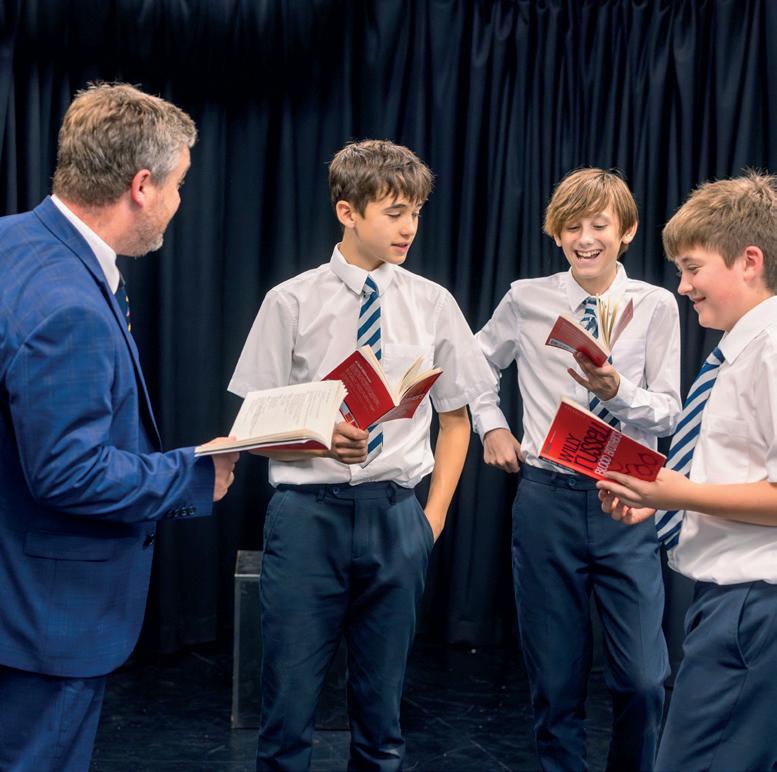
Pupils will have to take two compulsory units:
Component 1: Understanding drama – 40%
This component is a written exam in which students are assessed on their knowledge and understanding of how drama and theatre is developed and performed (AO3), including in connection to a set play and on their ability to analyse and evaluate the live theatre work of others (AO4). Students have 1 hour and 45 minutes to answer the paper.
The paper is divided into three compulsory sections:
• Section A: Theatre roles and terminology
• Section B: Study of set text
• Section C: Live theatre production
In the exam, students are expected to demonstrate knowledge and understanding of the subject content.
Component 2: Devising drama – 40%
This is a practical component in which students are assessed on their ability to create and develop ideas to communicate meaning for theatrical performance (AO1), apply theatrical skills to realise artistic intentions in live performance (AO2), and analyse and evaluate their own work (AO4). It is marked by teachers and moderated by AQA. For this component, students are required to complete the following two assessment tasks:
• Produce an individual Devising log, documenting the devising process (60 marks).
• Contribute to a final devised duologue or group performance (20 marks for each pupil’s contribution).
Component 3: Texts in practice – 20%.
This component is a practical component in which students are assessed on their ability to apply theatrical skills to realise artistic intentions in live performance (AO2). It is marked by AQA. For this component students must complete two assessment tasks:
• Study and present a second key extract (monologue, duologue or group performance) from the same play. Each student’s contribution to each key extract performance is marked out of 20.
• Study and present a key extract (monologue, duologue or group performance).
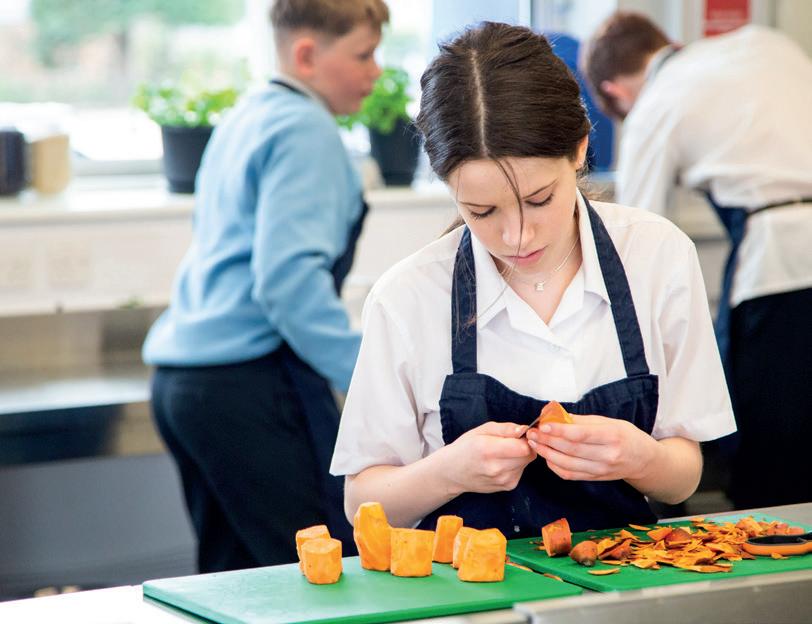
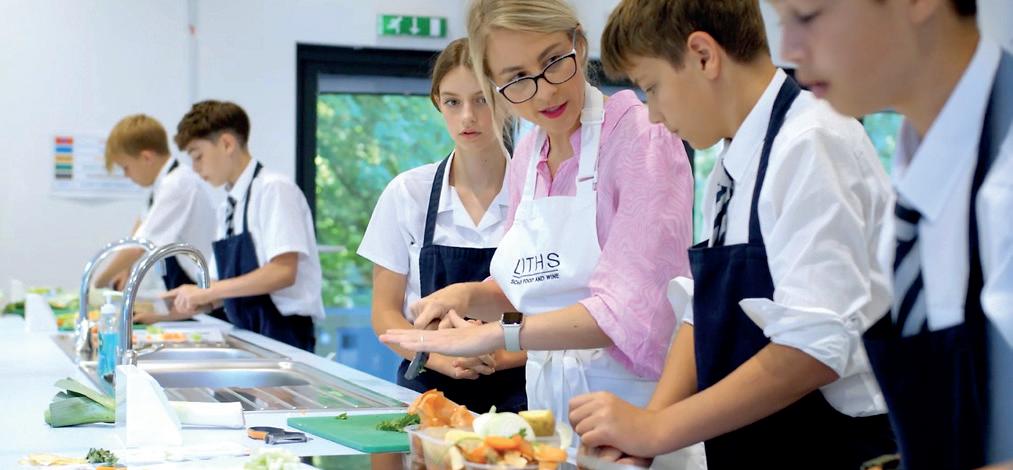
Why study Food Preparation and Nutrition?
GCSE Food Preparation and Nutrition is an exciting and creative course which focuses on practical cooking skills to ensure students develop a thorough understanding of nutrition, food provenance and the working characteristics of food materials. This subject provides a good level of knowledge which is advantageous if pursuing further studies in science-related A-levels and beyond, for example: Sport & Exercise Science, Medicine, Sport Biomedicine & Nutrition.
It also provides an excellent foundation for vocational courses in Hospitality and Catering. At its heart, this qualification focuses on nurturing students’ practical cookery skills to give them a strong understanding of nutrition.
Food preparation skills are integrated into five core topics: Food Nutrition and Health, Food Science, Food Safety, Food Choice and Food Provenance. Throughout the course pupils will also develop a range of practical skills.
The 12 main skill areas are:
• General cooking skills
• Knife skills
• Preparing fruit and vegetables
• Using the cooker
• Use of equipment
• Cooking methods
• Techniques to prepare, cook and combine different ingredients
• Sauce making
• Tenderising and marinating different ingredients
• Making dough
• Using raising agents
• Setting mixtures
Written Examination
Theoretical knowledge of food preparation and nutrition from the five core topics will be assessed through a 1 hour 45-minute written examination.
The paper has two sections:
• Section A consists of 20 multiple choice questions (20 marks)
• Section B consists of 5 questions (80 marks) The written examination counts for 50% of the final grade.
Non-exam assessment (NEA)
Task 1: Food Investigation (30 marks)
Pupils will carry out an investigation into the scientific principles that underpin the preparation and cooking of food. This task will provide pupils with an opportunity to demonstrate their knowledge and apply their understanding of the science behind cooking. They will investigate ingredients and explain how they work and why.
How Task 1 is assessed:
Written or electronic report (1,500–2,000 words) including photographic evidence of the practical investigation. NEA 1 counts for 15% of the final grade.
Task 2: Food Preparation Assessment (70 marks)
Pupils will research, plan, prepare, cook and present a three-course menu. This task will provide them with an opportunity to showcase their creativity and cooking skills. Photographs and written evidence of work is submitted, showing: research, recipe trials, planning, preparation, cooking and presentation of the final menu and evaluation.
How Task 2 is assessed:
Written or electronic portfolio including photographic evidence. Photographic evidence of the three final dishes must be included. NEA 2 counts for 35% of the final grade.
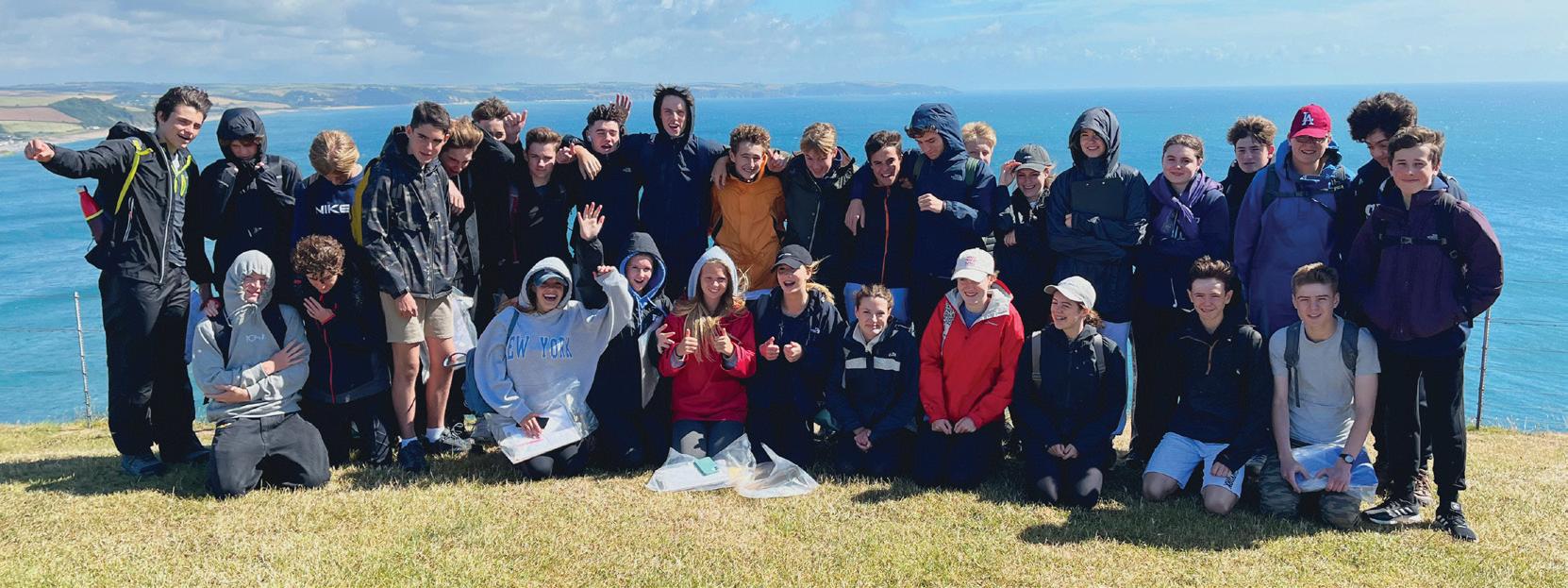
Geography at St Edmund’s is exciting and engaging ensuring everything is topical and relevant to the world around us.
The department have been awarded the Secondary Geography Quality Mark from the Geography Association; which recognises the excellent teaching and leadership within the department.
The course aims to help students apply and build on the fundamental building blocks of geographical knowledge, actively engaging in the process of geographical enquiry to develop as effective and independent learners and as critical and reflective thinkers with enquiring minds. It will develop their knowledge and understanding of geographical concepts and help them appreciate the relevance of these concepts to our changing world.
The course will also encourage students to develop a framework of spatial awareness in which to appreciate the importance of the location of places and environments from a local to global scale and appreciate that people have different views of, and attitudes to, the world, its environments and its issues.
Through the course students will develop and apply practical geographical enquiry skills, undertake geographical investigations that include both primary and secondary data collection and presentation, analysis and drawing conclusions. It will also help develop and apply their learning to the real world through fieldwork and develop their awareness of global issues and recognise the need for a sustainable future.
The work will see students improving their ICT abilities along with their analytical data skills. Students will undertake work in groups and independently. It is expected that they will develop their ability to construct and present well-reasoned arguments. Students will attend a compulsory field trip to Slapton Sands in Devon to understand fieldwork.
The GCSE has three sections:The Physical Environment, the Human Environment and Geographical Investigations:
• Fieldwork and UK Challenges
• Course Outline
• Human Geography
• Global Development
• Changing Cities
• Resource Management (energy)
• Physical Geography
• Changing UK landscapes (rivers and coasts)
• Ecosystems, biodiversity & management
• Weather and climate hazards
• Fieldwork and Skills UK Challenges Assessment.
The course is assessed through 3 one and a half hour examination papers, set and marked by Edexcel.
History is a fantastic subject to study at IGCSE. It is the study of the past, which helps you discover how the world evolved and contributes to developing your skills to look beyond the headlines, to ask questions properly, and to express your own opinions. History trains your mind and teaches you how to think and process information. Students will explore the subject from a diversity of perspectives, including social, economic, cultural and political.
Cambridge IGCSE History encourages the students to raise questions and to develop and deploy historical skills. Students are given the opportunity to:
• Explore historical concepts such as cause and consequence, change and continuity.
• Appreciate historical evidence and how to use it and gain a greater understanding of international issues and inter-relationships.
• Learn how to present clear, logical arguments.
Candidates who are awarded grades 9 to 4 in Cambridge IGCSE History are well prepared for A-level. Cambridge IGCSE is accepted by universities and employers worldwide as providing proof of historical skills, knowledge and understanding.
Section A
All pupils study all the core content below: The 19th century: The Development of Modern Nation States, 1848–1914
The content focuses on the following Key Questions:
• Were the Revolutions of 1848 important?
• How was Italy unified?
• How was Germany unified?
• Why was there a civil war in the United States and what were its results?
• Why, and with what effects, did nations gain and expand their overseas empires in the nineteenth century?
• What caused the First World War?
Section B
In addition, all pupils must also study one Depth Studies, which has been chosen as:
• The First World War, 1914–18
Assessment
Component 1: Two hours written paper
Component 2: Two hours written paper
Component 3: Coursework
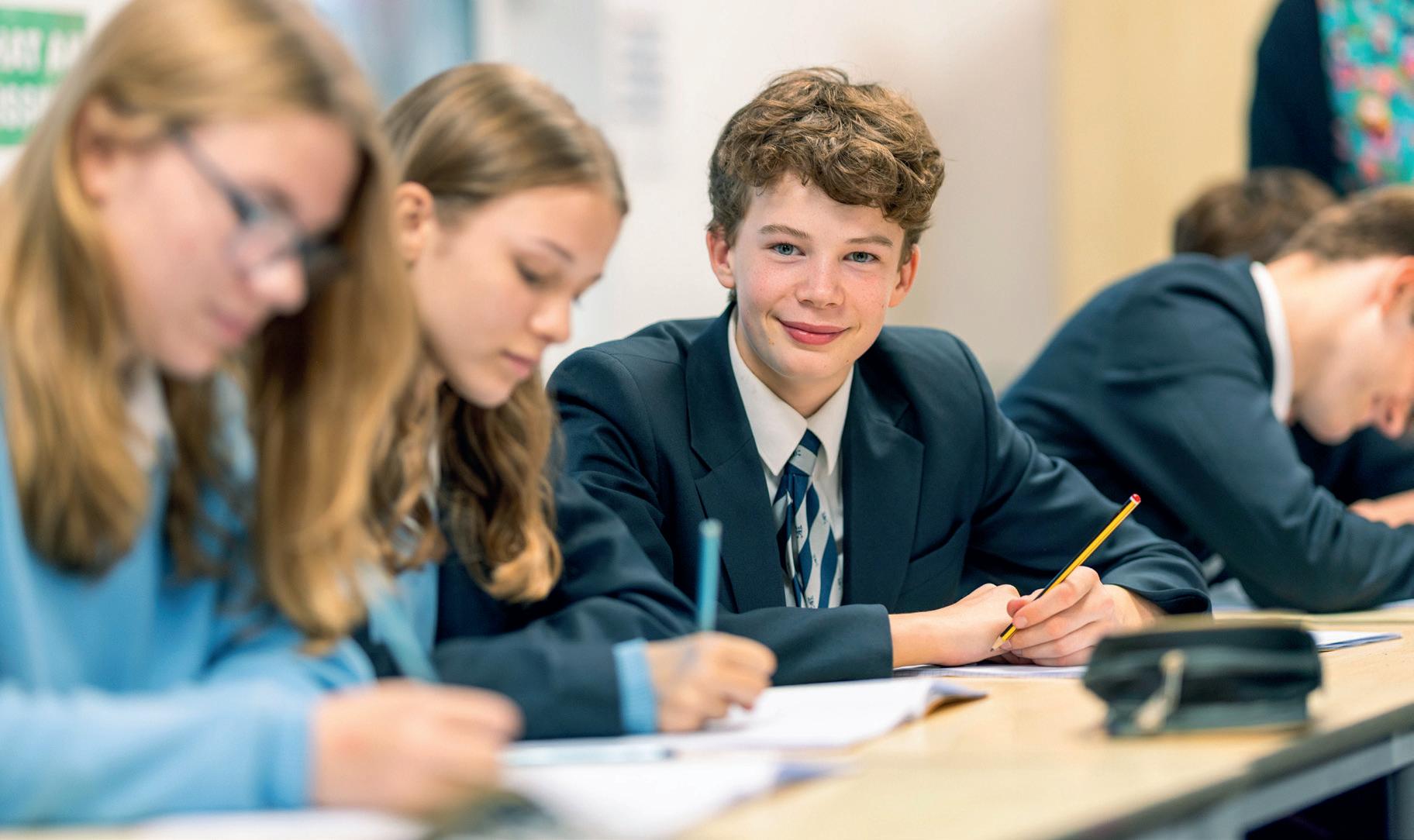
Studying music is not merely an academic pursuit; it is an immersive exploration of creativity, expression, and cultural significance. Unleash your potential as you explore the intricacies of musical theory, composition, and performance. Gain a profound understanding of the historical and cultural contexts that shape various musical genres, from classical masterpieces to contemporary hits. Through hands-on experiences and a comprehensive curriculum, our GCSE in music cultivates not only musical proficiency but also critical thinking skills, teamwork, and a deep appreciation for the universal language that is music.
Course Information:
OCR’s GCSE (9–1) in Music offers a contemporary, accessible, and integrated education in music, emphasizing performing, composing, and appraising. The curriculum encourages creativity, broadening musical horizons, and understanding through inspiring and challenging Areas of Study.
Learners are provided with the opportunity to explore performance and composition, focusing on their instrument and genre preferences, while also encouraging the development of new instrumental skills. The exploration of various genres, styles, and eras in the Areas of Study enhances understanding of musical context, language, and performance and composition skills.
Designed to cater to a diverse range of interests, instruments, personalities, and directions, OCR’s GCSE (9–1) in Music allows learners to choose instruments and Areas of Study based on their personal preferences and abilities.
Assessment and Skills:
Integrated Portfolio 1:
This component is worth 60 marks and represents 30% of the marks for GCSE. This component is internally assessed by the centre and externally moderated by OCR.
Learners’ understanding will be assessed through:
• a performance
• a composition to a learner determined brief.
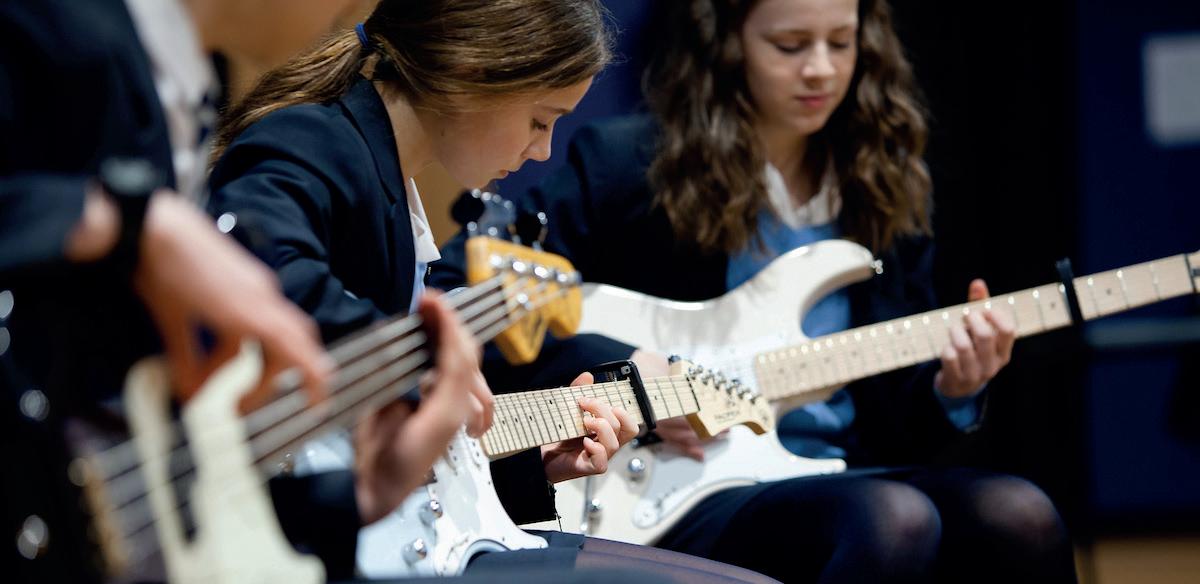
Integrated Portfolio 2:
This component is worth 60 marks and represents 30% of the marks for GCSE. This component is internally assessed by the centre and externally moderated by OCR.
Learners’ understanding will be assessed through:
• an ensemble performance
• a composition to a brief set by OCR.
Listening and Appraising:
This component will be externally assessed and contribute 40% of the overall qualification.
Learners will demonstrate and apply knowledge of:
• musical elements and/or features
• musical contexts
• musical language.
Skills:
• Actively engage in the music study process.
• Develop individual and group performing skills, enabling fluent and controlled musical communication.
• Cultivate composing skills to organize musical ideas and utilize appropriate resources.
• Recognize the links between performing, composing, and appraising activities, informing music development.
• Broaden musical experience, interests, imagination, and creativity.
• Develop knowledge, understanding, and skills necessary for effective musical communication.
• Gain awareness of various instruments, styles, approaches to performing and composing, and music technologies.
• Identify contrasting genres, styles, traditions, and develop awareness of musical chronology.
• Develop as effective, independent learners with enquiring minds.
• Reflect upon and evaluate their own and others’ music.
• Engage with and appreciate the diverse heritage of music, promoting personal, social, intellectual, and cultural development.
The AQA GCSE Physical Education course develops pupils’ knowledge and skills in a range of physical activities, and inspires them with a passion for the subject. Pupils will identify ways to develop and maintain a healthy lifestyle through participation in physical activity, and learn about the effects of physical activity on the body.
This course opens up a range of possibilities for further study at both A-Level and University. The study of Physical Education can lead on to university degrees in Sports Science, Sports Management, Exercise and Healthcare. Physical Education can also complement further study in Biology, Human Biology, Physics, Psychology, Nutrition, Sociology, teacher training and many more.
Pupils will gain an in-depth knowledge of human anatomy and physiology within sport, while also looking at movement analysis and physical training. They will learn about health, fitness and well-being, sports psychology and socio-cultural influences. Pupils will learn how to analyse data, and how this can be used to benefit the performer, increasing performance. Outside of these core topics, pupils will learn a variety of physical and leadership skills during the practical aspect of this course, helping to develop their confidence and improve on a range of interpersonal skills.
The course is assessed based on both academic and practical performance in two written exams and practical assessments across three sports. The course is broken down into three components:
Component 1: The human body and movement in physical activity and sport. This is assessed with a written paper worth 30% of the overall grade. The exam is 1 hour 15 minutes and has a combination of multiple choice, short answer and extended writing questions.
Component 2: Socio-cultural influences and well- being in physical activity and sport. This is assessed with a written paper worth 30% of the overall grade. The exam is 1 hour 15 minutes and has a combination of multiple choice, short answer and extended writing questions.
Component 3: Practical performance in physical activity and sport.This is a practical assessment and is worth 40% of the overall grade. It is broken down into two sections:
1. Performance assessment (75 marks)
2. Performance analysis (25 marks)
These marks will be assessed in three activities. One must be a team sport or activity, one must be in an individual sport or activity, and the third can be from either a team or an individual sport or activity. Each sport is graded in two sections:
1. Skill (10 marks): How well pupils can demonstrate standalone skills.
2. Full Context (15 marks): How well can they perform in a match situation.
• Associated Football
• Badminton
• Basketball
• Camogie
• Cricket
• Dance
• Figure Skating
• Gaelic Football
• Handball
• Hockey
• Hurling
• Ice Hockey
• Lacrosse
• Netball
• Rowing
• Rugby League
• Rugby Union
• Sailing
• Squash
• Table Tennis
• Tennis
• Volleyball
• Waterpolo
• Amateur Boxing
• Athletics
• Badminton
• Canoeing
• Cycling
• Dance
• Diving
• Equestrian
• Golf
• Gymnastics
• Kayaking
• Rock Climbing
• Sailing
• Sculling
• Skiing
• Snowboarding
• Squash
• Swimming
• Table Tennis
• Tennis
• Trampolining
• Windsurfing
The Cambridge National in Sport Science helps students appreciate how science and theoretical studies underpin sport at all levels. They will learn about physiology, injury prevention, technology and improving personal fitness through appropriate training and diet. This course will provide a good foundation for further study of sport and physical education at A-level and beyond. It will help to build core knowledge for areas including: physiotherapy, teaching/coaching, nutrition and biomechanics. There are many practical elements to the course alongside classroom-based independent and group assignments.
This course will teach pupils about the fundamentals of fitness through appropriate training and diet. It will help the pupils to understand and develop training programmes, how to adapt lifestyles and improve leadership skills. Pupils will learn how technology is used within sport and the effects of nutrition on training and performance. They will also learn how to prevent and treat different sporting injuries, and their application to everyday life.
Pupils will develop an understanding of how to live a healthy and active lifestyle, whether they choose to use it recreationally or for following a career in sport.
To gain an OCR Cambridge National Award Level 1 (equivalent to half a GCSE, Grades 1-4), pupils must complete mandatory units 1 and 2.
To gain an OCR Cambridge National Certificate Level 2 (Equivalent to a full GCSE grade 5-8), pupils will complete 3 of the 4 units below. 2 out of the 3 units will be coursework with 1 exam.
Merit 2, equivalent to a Grade 6 is required, when applying for sixth form and college places.
Unit 1: Reducing the risk of sports injuries and dealing with common medical conditions – Written exam paper (1 hour, 60 marks)
Unit 2: Applying principles of training, fitness and how it affects skill performance – Centre assessed task (written assignment)
Unit 3: The body’s response to physical activity and how technology informs this – Centre assessed task (written assignment)
Unit 4: Nutrition and sports performance –Centre assessed task (written assignment).
